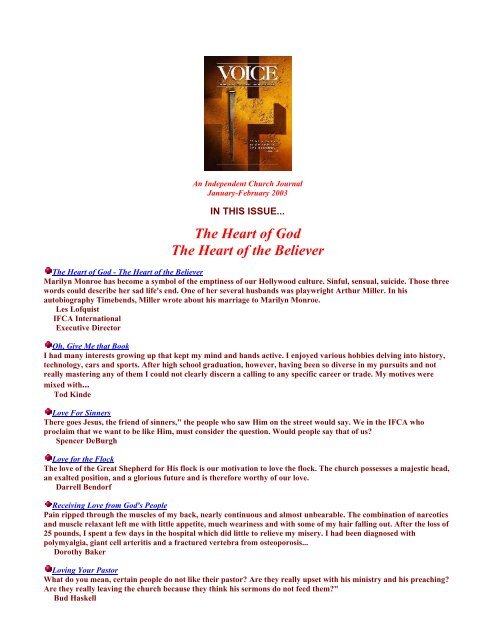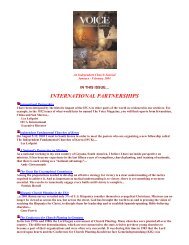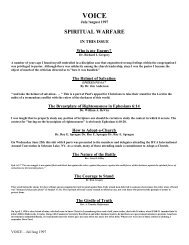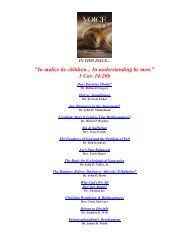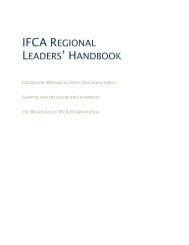The Heart of God The Heart of the Believer
The Heart of God The Heart of the Believer
The Heart of God The Heart of the Believer
You also want an ePaper? Increase the reach of your titles
YUMPU automatically turns print PDFs into web optimized ePapers that Google loves.
An Independent Church Journal<br />
January-February 2003<br />
IN THIS ISSUE...<br />
<strong>The</strong> <strong>Heart</strong> <strong>of</strong> <strong>God</strong><br />
<strong>The</strong> <strong>Heart</strong> <strong>of</strong> <strong>the</strong> <strong>Believer</strong><br />
<strong>The</strong> <strong>Heart</strong> <strong>of</strong> <strong>God</strong> - <strong>The</strong> <strong>Heart</strong> <strong>of</strong> <strong>the</strong> <strong>Believer</strong><br />
Marilyn Monroe has become a symbol <strong>of</strong> <strong>the</strong> emptiness <strong>of</strong> our Hollywood culture. Sinful, sensual, suicide. Those three<br />
words could describe her sad life's end. One <strong>of</strong> her several husbands was playwright Arthur Miller. In his<br />
autobiography Timebends, Miller wrote about his marriage to Marilyn Monroe.<br />
Les L<strong>of</strong>quist<br />
IFCA International<br />
Executive Director<br />
Oh, Give Me that Book<br />
I had many interests growing up that kept my mind and hands active. I enjoyed various hobbies delving into history,<br />
technology, cars and sports. After high school graduation, however, having been so diverse in my pursuits and not<br />
really mastering any <strong>of</strong> <strong>the</strong>m I could not clearly discern a calling to any specific career or trade. My motives were<br />
mixed with...<br />
Tod Kinde<br />
Love For Sinners<br />
<strong>The</strong>re goes Jesus, <strong>the</strong> friend <strong>of</strong> sinners," <strong>the</strong> people who saw Him on <strong>the</strong> street would say. We in <strong>the</strong> IFCA who<br />
proclaim that we want to be like Him, must consider <strong>the</strong> question. Would people say that <strong>of</strong> us?<br />
Spencer DeBurgh<br />
Love for <strong>the</strong> Flock<br />
<strong>The</strong> love <strong>of</strong> <strong>the</strong> Great Shepherd for His flock is our motivation to love <strong>the</strong> flock. <strong>The</strong> church possesses a majestic head,<br />
an exalted position, and a glorious future and is <strong>the</strong>refore worthy <strong>of</strong> our love.<br />
Darrell Bendorf<br />
Receiving Love from <strong>God</strong>'s People<br />
Pain ripped through <strong>the</strong> muscles <strong>of</strong> my back, nearly continuous and almost unbearable. <strong>The</strong> combination <strong>of</strong> narcotics<br />
and muscle relaxant left me with little appetite, much weariness and with some <strong>of</strong> my hair falling out. After <strong>the</strong> loss <strong>of</strong><br />
25 pounds, I spent a few days in <strong>the</strong> hospital which did little to relieve my misery. I had been diagnosed with<br />
polymyalgia, giant cell arteritis and a fractured vertebra from osteoporosis...<br />
Dorothy Baker<br />
Loving Your Pastor<br />
What do you mean, certain people do not like <strong>the</strong>ir pastor? Are <strong>the</strong>y really upset with his ministry and his preaching?<br />
Are <strong>the</strong>y really leaving <strong>the</strong> church because <strong>the</strong>y think his sermons do not feed <strong>the</strong>m?"<br />
Bud Haskell
Five Common Mistakes in Sharing Your Faith<br />
I don't know when I have felt any more embarrassed. As I backed my car into our garage, I stopped just before<br />
entering and opened my door to look at something lying on <strong>the</strong> driveway. <strong>The</strong>n, looking over my right shoulder, I<br />
continued backing up. I was startled by <strong>the</strong> sound <strong>of</strong> steel hitting steel. I gasped in horror...<br />
R. Larry Moyer<br />
Canvassing for Christ<br />
This is a great idea for all our IFCA churches and <strong>the</strong> people at Portage Community Bible Church would like to<br />
encourage you to do <strong>the</strong> same in your community.<br />
Portage Community Bible Church<br />
FEATURES...<br />
CHAPLAIN'S DIARY<br />
<strong>The</strong> Missionary Ministry <strong>of</strong> Chaplaincy<br />
Looking for a Few Good Chaplains<br />
I am a recent graduate <strong>of</strong> Dallas <strong>The</strong>ological Seminary and have been ministering to 900 Marines and sailors in<br />
California's Mojave Desert for <strong>the</strong> past six months. As you can imagine, my ministry is many things, but it is never<br />
boring.<br />
LT Mike Foskett, CHC, USNR<br />
WOMEN'S VOICE<br />
I Love to Sing<br />
Yes, I love to singand even though I've never been able to carry a tune, it really doesn't matter. In fact, I'm like my<br />
fa<strong>the</strong>r-in-law who was told while singing in <strong>the</strong> choir in Bible College, "Harry, you're a half note <strong>of</strong>f." He replied, "O,<br />
thank you; I've never been that close before!"<br />
Elvia Sprague
Love-<strong>The</strong> <strong>Heart</strong> <strong>of</strong> <strong>God</strong>, <strong>The</strong> <strong>Heart</strong> <strong>of</strong> <strong>the</strong> <strong>Believer</strong><br />
Rev. Les L<strong>of</strong>quist<br />
Executive Director<br />
Marilyn Monroe has become a symbol <strong>of</strong> <strong>the</strong> emptiness <strong>of</strong> our Hollywood culture. Sinful, sensual,<br />
suicide. Those three words could describe her sad life's end. One <strong>of</strong> her several husbands was<br />
playwright Arthur Miller. In his autobiography Timebends, Miller wrote about his marriage to<br />
Marilyn Monroe. He watched her descend into <strong>the</strong> depths <strong>of</strong> depression and despair. He feared for<br />
her life as he watched <strong>the</strong>ir relationship crumble due to his wife's paranoia and growing<br />
dependence on barbiturates. One night, after ano<strong>the</strong>r physician had been persuaded to give her<br />
yet ano<strong>the</strong>r shot, Miller stood by her as she slept. "I found myself straining to imagine<br />
miracles…What if she were to wake and I were able to say, '<strong>God</strong> loves you, darling,' and she were<br />
able to believe it!'" (Timebends, NY: Harper & Row, 1987, p. 482).<br />
To <strong>the</strong> unbelieving Arthur Miller, he apparently thought that a certain knowledge <strong>of</strong> <strong>the</strong> love <strong>of</strong><br />
<strong>God</strong> would've changed <strong>the</strong> desperate condition he and his wife faced. That's remarkable, coming<br />
from a man who said he had "lost his religion" (Ibid., p. 482). Yet in a world <strong>of</strong> tragic unbelief,<br />
<strong>God</strong>'s love is truly life-changing.<br />
THE LOVE OF GOD<br />
"<strong>God</strong> is love" was twice repeated by John in his first epistle (1 John 4:8, 16). This is not <strong>the</strong><br />
complete truth about <strong>God</strong> as far as His written revelation is concerned. But this is never<strong>the</strong>less an<br />
amazing truth which must be seen in its full context in order to be completely understood.<br />
1. <strong>The</strong> Biblical context is essential. <strong>The</strong> Bible says that <strong>God</strong> is holy, undefiled, separated from<br />
sinners, exalted above <strong>the</strong> heavens (Hebrews 7:26). He is "a righteous judge, and a <strong>God</strong> who has<br />
indignation every day" (Psalm 7:11). He is a jealous <strong>God</strong> absolutely committed to preserving His<br />
glory for Himself (Exodus 20:1-5). He "is a consuming fire" (Hebrews 12:29). <strong>God</strong>'s love must be<br />
seen in that context, not negating any <strong>of</strong> those truths. It must be kept in <strong>the</strong> balance that Romans<br />
11:22 presents: "Behold <strong>the</strong> goodness and severity <strong>of</strong> <strong>God</strong>."<br />
2. <strong>The</strong> Ancient world's context is also important. In 1 John 4:8, 16 <strong>the</strong> Greek word for "love" was<br />
highly unusual in first-century culture. <strong>The</strong> word agape was not <strong>the</strong> word <strong>the</strong> Greek and Roman<br />
pagans would have used. <strong>The</strong>y far more frequently used o<strong>the</strong>r common words for love: phile<br />
("bro<strong>the</strong>rly love") and eros ("romantic love" and "sexual passion"). <strong>The</strong> pagan gods <strong>of</strong> <strong>the</strong> First<br />
Century were lustful, sentimental, and shallow in <strong>the</strong>ir love. <strong>The</strong>y only loved those who loved<br />
<strong>the</strong>m. That is not <strong>the</strong> agape love <strong>of</strong> <strong>the</strong> <strong>God</strong> <strong>of</strong> <strong>the</strong> Bible!<br />
3. <strong>The</strong> context within First John must also be remembered. Near <strong>the</strong> beginning <strong>of</strong> that letter John<br />
wrote "<strong>God</strong> is light" (1 John 1:5). This refers to <strong>God</strong>'s holiness, <strong>God</strong>'s truth, and <strong>God</strong>'s splendor.<br />
When considering "<strong>God</strong> is love," you cannot forget that within <strong>the</strong> very same epistle <strong>the</strong> balance is<br />
provided: "<strong>God</strong> is light."<br />
Having set all <strong>of</strong> this in context, it is so very amazing to see <strong>the</strong> portrayal <strong>of</strong> <strong>God</strong>'s love in <strong>the</strong><br />
Scriptures. His love caused Him to give His Son as a sacrifice for sin (John 3:16). His love was<br />
demonstrated toward sinners and enemies when Christ died in our behalf (Romans 5:6-10). His<br />
love is rich and great (Ephesians 2:4) and is in eternal contrast with our world <strong>of</strong> malice, envy, and<br />
hate (Titus 3:3-4).<br />
Packer's words about <strong>the</strong> love <strong>of</strong> <strong>God</strong> are pr<strong>of</strong>ound:<br />
"It is staggering that <strong>God</strong> should love sinners; yet it is true. <strong>God</strong> loves creatures who have become<br />
unlovely and (one would have thought) unlovable. <strong>The</strong>re was nothing whatever in <strong>the</strong> objects <strong>of</strong>
His love to call it forth; nothing in man could attract or prompt it. Love among men is awakened<br />
by something in <strong>the</strong> beloved, but <strong>the</strong> love <strong>of</strong> <strong>God</strong> is free, spontaneous, unevoked, uncaused. <strong>God</strong><br />
loves men because He has chosen to love <strong>the</strong>m" (Knowing <strong>God</strong>, IVP, 1973, p. 112).<br />
That is what Paul meant when he wrote about <strong>God</strong>'s love to those who had been dead in <strong>the</strong>ir sins,<br />
who lived by <strong>the</strong> devil's standards as displayed in <strong>the</strong> world and in full gratification <strong>of</strong> <strong>the</strong>ir sinful<br />
desires. "But <strong>God</strong>, who is rich in mercy, because <strong>of</strong> His great love with which He loved us, even<br />
when we were dead in trespasses, made us alive toge<strong>the</strong>r with Christ (by grace you have been<br />
saved), and raised us up toge<strong>the</strong>r and made us sit toge<strong>the</strong>r in <strong>the</strong> heavenly places in Christ Jesus<br />
that in <strong>the</strong> ages to come He might show <strong>the</strong> exceeding riches <strong>of</strong> His grace in His kindness toward<br />
us in Christ Jesus" (Ephesians 2:4-6).<br />
RESULTS OF GOD'S LOVE<br />
For those who come to experience it rightly, <strong>the</strong> love <strong>of</strong> <strong>God</strong> is eternally life-changing! We who are<br />
so corrupted and twisted by sin, self-absorbed and arrogant by nature, undergo a total and<br />
complete transformation. <strong>God</strong> pours His love into our hearts (i.e. those who are truly born again)<br />
and by <strong>the</strong> power <strong>of</strong> <strong>the</strong> indwelling Holy Spirit, <strong>the</strong> love <strong>of</strong> <strong>God</strong> lavishly overflows out <strong>of</strong> our<br />
hearts and lives (Romans 5:5).<br />
Genuine faith will inevitably be shown by love, a <strong>God</strong>-given love not easily counterfeited because<br />
<strong>of</strong> <strong>the</strong> supernatural extent <strong>of</strong> this love:<br />
• love for <strong>God</strong> (1 Cor. 16:22)<br />
• love for <strong>God</strong>'s Word (Ps. 119:97)<br />
• love for <strong>the</strong> brethren (1 Jn. 3:14)<br />
• love for righteousness (Rom. 6:17-18)<br />
• love for our enemies (Mt. 5:44)<br />
<strong>God</strong>'s transforming love is nothing like <strong>the</strong> romance <strong>of</strong> <strong>the</strong> world which involves a near-helpless<br />
sensation <strong>of</strong> desire that is selfish. It is not a mere feeling or emotion that ebbs and flows. It is not<br />
an uncontrollable passion, a blind emotion.<br />
<strong>God</strong>'s love arises from His deliberate choice. And in <strong>the</strong> greatest description <strong>of</strong> love ever written,<br />
we see <strong>the</strong> volitional and deliberate nature <strong>of</strong> <strong>God</strong>'s love which should be similarly seen in <strong>the</strong> lives<br />
<strong>of</strong> his people:<br />
"Love is patient, love is kind, and is not jealous; love does not brag and is not arrogant, does not<br />
act unbecomingly; it does not seek its own, is not provoked, does not take into account a wrong<br />
suffered, does not rejoice in unrighteousness, but rejoices with <strong>the</strong> truth; bears all things, believes<br />
all things, hopes all things, endures all things" (1 Corinthians 13:4-7).<br />
CONCLUSION<br />
Philosophers have written <strong>of</strong> <strong>the</strong> "silence <strong>of</strong> <strong>God</strong>" (Sartre) and <strong>the</strong> "absence <strong>of</strong> <strong>God</strong>" (Jaspers).<br />
<strong>The</strong>ologians have spoken <strong>of</strong> <strong>the</strong> "eclipse <strong>of</strong> <strong>God</strong>" (Buber) and even <strong>the</strong> "death <strong>of</strong> <strong>God</strong>"<br />
(Hamilton). But <strong>the</strong> Bible victoriously proclaims <strong>the</strong> love <strong>of</strong> <strong>God</strong>. And we celebrate His love for<br />
without it, our lives would be as empty and tragic as Marilyn Monroe's.<br />
<strong>The</strong> heart <strong>of</strong> one <strong>of</strong> Paul's most significant New Testament prayers involved <strong>the</strong> knowledge <strong>of</strong><br />
<strong>God</strong>'s love: "For this reason I bow my knees to <strong>the</strong> Fa<strong>the</strong>r…that He would grant you…to be able
to comprehend with all <strong>the</strong> saints what is <strong>the</strong> width and length and depth and height--to know <strong>the</strong><br />
love <strong>of</strong> Christ which passes knowledge" (Ephesians 3:14, 16, 18-19).<br />
May we in some measure comprehend <strong>the</strong> love <strong>of</strong> <strong>God</strong>, and may it be seen in every aspect <strong>of</strong> our<br />
lives.<br />
Oh, Give Me that Book<br />
Deepening a Desire for <strong>the</strong> Word<br />
Todd Kinde<br />
I had many interests growing up that kept my mind and hands active. I enjoyed various hobbies<br />
delving into history, technology, cars and sports. After high school graduation, however, having<br />
been so diverse in my pursuits and not really mastering any <strong>of</strong> <strong>the</strong>m I could not clearly discern a<br />
calling to any specific career or trade. My motives were mixed with aspirations for financial<br />
advancement which could support my multiple hobbies and pursuits.<br />
During those teen years my mo<strong>the</strong>r and I enjoyed talking openly about my latest dream or<br />
interest. She patiently listened to my musings and ponderings <strong>of</strong> what to do with life. In one <strong>of</strong> our<br />
probing conversations Mom, being ever conscious <strong>of</strong> <strong>the</strong> Lord's return, simply asked me what I<br />
would want to be found doing when Christ returned. My answer was surprisingly immediate and<br />
revealing to me. At that moment it dawned upon me that I wanted to be studying <strong>the</strong> Bible when<br />
Christ returned.<br />
I still did not know what <strong>God</strong>'s call upon my life would be as it related to a career or trade but I<br />
knew that I wanted to study <strong>the</strong> Bible. I needed to learn how to study <strong>the</strong> Bible and so I enrolled in<br />
a Biblical Studies program at a local Christian liberal arts college. <strong>The</strong>re was still work to do with<br />
my values and priorities but <strong>the</strong>re was emerging a deepening desire for <strong>the</strong> Word <strong>of</strong> <strong>God</strong>. <strong>The</strong><br />
words <strong>of</strong> John Wesley expressed my wakening passion, "Oh, give me that book! At any price give<br />
me <strong>the</strong> book <strong>of</strong> <strong>God</strong>! Let me be a man <strong>of</strong> one book."1<br />
<strong>The</strong> psalmist declares, "I delight in your decrees; I will not neglect your Word" (Psalm 119.16).<br />
This delight for <strong>the</strong> Holy Scriptures is <strong>the</strong> joy <strong>of</strong> a disciple who loves <strong>the</strong> Lord. One who loves <strong>the</strong><br />
Lord will love <strong>the</strong> written Word through which He has chosen to reveal Himself. Similarly, if we<br />
are to love one ano<strong>the</strong>r we will love <strong>the</strong> Word <strong>of</strong> <strong>God</strong>. John writes in his first epistle, "This is how<br />
we know that we love <strong>the</strong> children <strong>of</strong> <strong>God</strong>: by loving <strong>God</strong> and carrying out His commands" (1<br />
John 5.2). <strong>The</strong> Scriptures are <strong>the</strong> means by which we delight in <strong>God</strong> and find expression for <strong>the</strong><br />
love <strong>of</strong> His people. With this truth in mind we now ponder a few dimensions <strong>of</strong> <strong>God</strong>'s Word and<br />
how we can deepen our delight in it.<br />
<strong>The</strong> Word is Life Giving<br />
Dimensions <strong>of</strong> Delight in <strong>the</strong> Word <strong>of</strong> <strong>God</strong><br />
One delight <strong>of</strong> <strong>God</strong>'s Word is its life-giving nature. Hebrews writes that <strong>the</strong> Word <strong>of</strong> <strong>God</strong> is itself<br />
living and active (Hebrews 4.12). It is <strong>the</strong> Word <strong>of</strong> <strong>the</strong> Creator that has been revealed to us. <strong>God</strong><br />
spoke <strong>the</strong> world into existence with a Word. We tend to value objects that are hand crafted<br />
placing a higher price on <strong>the</strong>m or holding a greater sentiment for <strong>the</strong>m. We are not, however,<br />
merely hand made. We are Word made. <strong>God</strong> formed us out <strong>of</strong> <strong>the</strong> dust <strong>of</strong> <strong>the</strong> earth with His<br />
Word. We were shaped by <strong>the</strong> Word <strong>of</strong> <strong>God</strong> into His image and likeness.<br />
<strong>God</strong> continues His work by His Word. As we were created in body by His Word so we are<br />
recreated in spirit by His Word. <strong>God</strong> gives us faith and new life in Christ through <strong>the</strong> Word and is
continuing to shape and form us into <strong>the</strong> likeness <strong>of</strong> His Son through that same Word. "He chose<br />
to give us birth through <strong>the</strong> Word <strong>of</strong> truth, that we might be a kind <strong>of</strong> first fruits <strong>of</strong> all He<br />
created" (James 1:18).<br />
<strong>The</strong> Word is Authoritative<br />
A second delight <strong>of</strong> <strong>God</strong>'s Word is its power and authority. "<strong>The</strong> voice <strong>of</strong> <strong>the</strong> LORD is powerful;<br />
<strong>the</strong> voice <strong>of</strong> <strong>the</strong> LORD is majestic" (Psalm 29:4). <strong>The</strong> centurion <strong>of</strong> Mat<strong>the</strong>w 8 came to Jesus with<br />
trust in <strong>the</strong> authority <strong>of</strong> <strong>the</strong> Word and stated, "Just say <strong>the</strong> Word, and my servant will be healed.<br />
For I myself am a man under authority" (Mat<strong>the</strong>w 8:8-9). <strong>The</strong> power <strong>of</strong> <strong>God</strong>'s creative Word is an<br />
authoritative Word reigning over all things.<br />
<strong>The</strong> psalmist vows, "I will bow down toward your holy temple and will praise your Name for your<br />
love and your faithfulness, for you have exalted above all things your Name and your Word"<br />
(Psalm 138:2). As we delight in <strong>the</strong> Scriptures we are humbled by its weight and authority. It<br />
bends us into a position <strong>of</strong> submission to <strong>the</strong> Lord. Having an authority in our lives is not a servile<br />
thing. Ra<strong>the</strong>r, we are free from <strong>the</strong> fear <strong>of</strong> having to trust ourselves and are given <strong>the</strong> confidence<br />
<strong>of</strong> trusting <strong>God</strong> who has revealed His good, pleasing and perfect will in <strong>the</strong> Word (Romans 12:2).<br />
<strong>The</strong> Word is Personal<br />
A third delight <strong>of</strong> <strong>God</strong>'s Word is its intimacy. <strong>The</strong> Word <strong>of</strong> <strong>God</strong> is personal. Over 100 times <strong>the</strong><br />
"Word <strong>of</strong> <strong>the</strong> Lord comes to" a prophet in <strong>the</strong> Old Testament. We see that <strong>the</strong> Lord comes<br />
personally in His Word <strong>of</strong>ten calling His prophets and servants by name. In <strong>the</strong> New Testament<br />
parable <strong>of</strong> <strong>the</strong> rich man and Lazarus, we know Lazarus by name who is with <strong>the</strong> Lord in Heaven<br />
but we do not know <strong>the</strong> name <strong>of</strong> <strong>the</strong> rich man who is separated from <strong>the</strong> Lord (Luke 16:19). When<br />
<strong>the</strong> Lord raised ano<strong>the</strong>r Lazarus from <strong>the</strong> tomb He cried out to him by name, "Lazarus, come<br />
forth!" (Luke 11:43). Jesus appeared to Mary as she wept at <strong>the</strong> empty tomb and gently spoke to<br />
her, "Mary" (John 20:16). Jesus sent for <strong>the</strong> disciples and specifically Peter calling him by name<br />
to restore him into His presence with <strong>the</strong> Word (Mark 16:7).<br />
<strong>God</strong> deals personally with you through His Word calling you to intimacy and obedience. In <strong>the</strong><br />
above examples <strong>the</strong> voice <strong>of</strong> <strong>God</strong> came to particular people in history past. We do not expect to<br />
audibly hear <strong>the</strong> voice <strong>of</strong> <strong>God</strong> calling us by name this side <strong>of</strong> eternity. But His written Word to us<br />
is just as personal and intimate. <strong>God</strong> knows who you are, He knows your background, and He<br />
knows your every concern. <strong>God</strong> has revealed Himself to you in His written Word. Delight in His<br />
presence. Delight in His Word.<br />
Deepening Our Delight in <strong>the</strong> Word <strong>of</strong> <strong>God</strong><br />
How <strong>the</strong>n can we go deeper in <strong>the</strong>se and o<strong>the</strong>r delightful dimensions <strong>of</strong> <strong>God</strong>'s Word? Peter exhorts<br />
us to "crave <strong>the</strong> pure milk <strong>of</strong> <strong>the</strong> Word" (I Peter 2:2). <strong>The</strong> psalmist exclaims, "How sweet are your<br />
Words to my taste, sweeter than honey to my mouth!" (Psalm 119:103). Yet we are all too easily<br />
content with crusty bread. We forget that we do "not live on bread alone but on every Word that<br />
comes from <strong>the</strong> mouth <strong>of</strong> <strong>the</strong> LORD" (Deuteronomy 8:3). We deepen our craving for <strong>the</strong> delights<br />
<strong>of</strong> <strong>the</strong> Word by enjoying it <strong>of</strong>ten and in larger portions.<br />
When teaching a Bible survey course at a local university, I required <strong>the</strong> students to read through<br />
<strong>the</strong> entire Old Testament. <strong>The</strong> reading record sheets returned to me were insightful. Many had<br />
read a percentage <strong>of</strong> <strong>the</strong> Scripture, which would ensure that a certain grade was received. Once<br />
<strong>the</strong> percentage was attained some students stopped reading <strong>the</strong>ir Bibles. I had not intended <strong>the</strong><br />
Word to be merely ano<strong>the</strong>r textbook for required reading. I wanted <strong>the</strong> Word to be <strong>the</strong>ir delight<br />
as <strong>the</strong> revelation <strong>of</strong> <strong>God</strong> and as a source <strong>of</strong> spiritual nourishment. <strong>The</strong>ir experience was, however,<br />
<strong>the</strong> mechanistic plight we all face in rigidly reading our Bibles out <strong>of</strong> a sense <strong>of</strong> duty. Our
experience should be like that <strong>of</strong> <strong>the</strong> prophet, "When your Words came, I ate <strong>the</strong>m; <strong>the</strong>y were my<br />
joy and my heart's delight, for I bear your name, O Lord <strong>God</strong> Almighty" (Jeremiah 15:16).<br />
A man who overcame <strong>the</strong> rigidity <strong>of</strong> dutiful Bible reading and experienced <strong>the</strong> prophet's joy was<br />
George Mueller. He is noted for his faithfulness in prayer and trust in <strong>God</strong> to provide for <strong>the</strong><br />
ministry. His life story is filled with <strong>God</strong>'s interventions to provide for <strong>the</strong> orphans under his care<br />
in England during <strong>the</strong> 1800's. He was indeed a man <strong>of</strong> prayer but he was first a man <strong>of</strong> <strong>the</strong> Word<br />
and found great delight in it. His personal testimony <strong>of</strong> deepening that delight is immensely<br />
helpful and refreshingly practical.<br />
"I saw that <strong>the</strong> most important thing I had to do was to give myself to <strong>the</strong> reading <strong>of</strong> <strong>the</strong> Word <strong>of</strong><br />
<strong>God</strong> and to meditation on it…<strong>The</strong> first thing I did, after having asked in a few words <strong>the</strong> Lord's<br />
blessing upon His precious Word, was to begin to meditate on <strong>the</strong> Word <strong>of</strong> <strong>God</strong>; searching, as it<br />
were, into every verse, to get blessing out <strong>of</strong> it; not for <strong>the</strong> sake <strong>of</strong> <strong>the</strong> public ministry <strong>of</strong> <strong>the</strong> Word;<br />
not for <strong>the</strong> sake <strong>of</strong> preaching on what I had meditated upon; but for <strong>the</strong> sake <strong>of</strong> obtaining food for<br />
my own soul…Now what is food for <strong>the</strong> inner man: not prayer, but <strong>the</strong> Word <strong>of</strong> <strong>God</strong>; and here<br />
again not <strong>the</strong> simple reading <strong>of</strong> <strong>the</strong> Word <strong>of</strong> <strong>God</strong>, so that it only passes through our minds, just as<br />
water runs through a pipe, but considering what we read, pondering over it, and applying it to our<br />
hearts…"2<br />
Deepening our delight in <strong>the</strong> Word is <strong>of</strong> first importance for in it we find food for our souls. That<br />
food is <strong>God</strong> Himself revealed in Christ. Delight is deepened when we linger in <strong>the</strong> green pastures<br />
<strong>of</strong> <strong>the</strong> Scriptures and slowly savor its portions. As we delight in <strong>the</strong> Word we will soon be satisfied<br />
with nothing less. <strong>The</strong> Word transforms our priorities, passions, and pursuits. We will read o<strong>the</strong>r<br />
books but <strong>the</strong>y will not satisfy our sense <strong>of</strong> delight as <strong>the</strong> one Book.<br />
Many years have passed since that afternoon conversation with Mom. <strong>The</strong> journey has at times<br />
been wandering and circuitous but my many interests have galvanized into a singular passion for<br />
<strong>the</strong> Word <strong>of</strong> <strong>God</strong>. "I delight in your decrees; I will not neglect your Word" (Psalm 119:16). <strong>God</strong><br />
grant that we might be a people <strong>of</strong> <strong>the</strong> Word being shaped and formed by it into <strong>the</strong> image <strong>of</strong> His<br />
Son, Christ Jesus.<br />
Todd Kinde is Senior Pastor <strong>of</strong> Grace Bible Church in Grandville, MI (an IFCA member church for<br />
56 years).<br />
1 John Wesley, "<strong>The</strong> Sermons Preface: An Introductory Comment." <strong>The</strong> Bicentennial Edition <strong>of</strong><br />
<strong>the</strong> Works <strong>of</strong> John Wesley. ed. Albert Cook Outler (Nashville, Abingdon Press. 1984), Section 5.<br />
2 George Mueller, Autobiography <strong>of</strong> George Mueller. comp. Fred Bergen (London, J. Nisbet Co.,<br />
1906), 152-154; quoted in John Piper, Desiring <strong>God</strong> (Portland, Multnomah Press, 1986), 127-129,<br />
n. 6.
Love for Sinners<br />
Spencer DeBurgh<br />
<strong>The</strong>re goes Jesus, <strong>the</strong> friend <strong>of</strong> sinners," <strong>the</strong> people who saw Him on <strong>the</strong> street would say. We in<br />
<strong>the</strong> IFCA who proclaim that we want to be like Him, must consider <strong>the</strong> question. Would people<br />
say that <strong>of</strong> us? Does our love for Jesus compel us to be <strong>the</strong> friend <strong>of</strong> sinners as He was?<br />
Luke 15 is <strong>the</strong> Parable <strong>of</strong> <strong>the</strong> Prodigal. Or is it? Aren't <strong>the</strong>re two sons? If we place <strong>the</strong> parable in<br />
its context, it is actually <strong>the</strong> parable <strong>of</strong> <strong>the</strong> older bro<strong>the</strong>r. Jesus spoke this parable to an audience<br />
<strong>of</strong> Pharisees who had <strong>the</strong> attitude <strong>of</strong> <strong>the</strong> older bro<strong>the</strong>r (vv. 1-3).<br />
From this interpretive starting point, <strong>the</strong> symbolism is easily revealed. <strong>The</strong> fa<strong>the</strong>r is <strong>God</strong>, or Jesus;<br />
<strong>the</strong> prodigal represents <strong>the</strong> sinners and tax collectors whom Jesus welcomed (vv. 1-2); and <strong>the</strong><br />
older bro<strong>the</strong>r represents <strong>the</strong> Pharisee. <strong>The</strong> parable is told because <strong>the</strong> Pharisees complained and<br />
grumbled (v. 2). We hear this grumbling from <strong>the</strong> mouth <strong>of</strong> <strong>the</strong> older bro<strong>the</strong>r in <strong>the</strong> parable (vv.<br />
28-30).<br />
<strong>The</strong> lowest put-down becomes <strong>the</strong> highest praise<br />
<strong>The</strong> Pharisees' grumbling put down, ironically, becomes high praise. <strong>The</strong>y sneer out a low charge,<br />
"This man welcomes sinners," meaning "Jesus must be a corrupt teacher, a wicked man himself."<br />
But <strong>the</strong> truth behind <strong>the</strong>ir reproach against Him becomes a statement <strong>of</strong> honor to Him and good<br />
news to all men.<br />
How wonderful that this declaration <strong>of</strong> Jesus' mercy and grace comes from <strong>the</strong> mouths <strong>of</strong> <strong>the</strong> most<br />
ungracious, judgmental legalists. <strong>The</strong>se cold-hearted men here make <strong>the</strong> statement <strong>of</strong> <strong>God</strong>'s<br />
warm-hearted acceptance. In this tiny phrase <strong>the</strong> gospel <strong>of</strong> salvation for sinners is declared by <strong>the</strong><br />
ones who would oppose <strong>the</strong> Savior throughout His earthly ministry.<br />
Why does He welcome sinners?<br />
Why did sinners ga<strong>the</strong>r around Him? Our text answers this question with great specificity. Verse<br />
1 answers this question with an infinitive <strong>of</strong> purpose. Jesus welcomed <strong>the</strong> sinners because <strong>the</strong>y<br />
drew near Him "in order to hear Him." Many drew near to Jesus for a healing, or a free meal, but<br />
<strong>the</strong>se came because <strong>the</strong>y wanted to hear His teaching. Jesus spoke <strong>the</strong> truth, so certainly Jesus, in<br />
that teaching, would reprove <strong>the</strong>ir sins. He told <strong>the</strong>m <strong>of</strong> <strong>the</strong> righteous kingdom <strong>of</strong> Heaven and <strong>of</strong><br />
<strong>the</strong>ir need to repent. He spoke <strong>the</strong> truth--which cut across <strong>the</strong>ir lifestyle--and <strong>the</strong>y listened. <strong>The</strong>y<br />
stood with His teaching even though His teaching identified <strong>the</strong>m as sinners. <strong>The</strong>y took sides with<br />
Jesus against <strong>the</strong>mselves. <strong>The</strong>y did not draw near Jesus to make excuses, or to continue <strong>the</strong>ir<br />
sinful lifestyles. <strong>The</strong>y were drawn by His teaching which promised regeneration and a new life<br />
<strong>The</strong>se are <strong>the</strong> sinners Jesus welcomes; <strong>the</strong> ones who, admitting <strong>the</strong>ir lostness, ga<strong>the</strong>r in to hear <strong>the</strong><br />
way <strong>of</strong> salvation. This is <strong>the</strong> key that unlocks <strong>the</strong> meaning <strong>of</strong> <strong>the</strong> three parables in Luke 15. How<br />
does <strong>the</strong> shepherd receive <strong>the</strong> lost sheep? How does <strong>the</strong> woman receive <strong>the</strong> lost coin? How does <strong>the</strong><br />
fa<strong>the</strong>r receive his prodigal son? This is how Jesus receives repentant sinners!<br />
<strong>The</strong> prodigal welcomed with a surprise party<br />
Read <strong>the</strong> narrative <strong>of</strong> <strong>the</strong> prodigal son's return (vv. 17-24) and consider <strong>the</strong> son's reasoning in<br />
light <strong>of</strong> <strong>the</strong> fa<strong>the</strong>r's reasoning. <strong>The</strong> son, as sinner, did not expect to be welcomed. <strong>The</strong> boy has<br />
blown it and he knows it. What he says in verses 18 and 19 is absolutely, fundamentally correct.<br />
His reasoning is morally flawless, he had received all that was due his as a son and he has<br />
squandered it. <strong>The</strong> prodigal knew that he had sinned and had punishment coming. He committed
<strong>the</strong> crime and he knew he ought to suffer <strong>the</strong> time. So what he said here was right, as far as he<br />
could see. But what did he not see?<br />
He was making his correct calculation based on <strong>the</strong> power <strong>of</strong> his sin but not on <strong>the</strong> power <strong>of</strong> His<br />
fa<strong>the</strong>r's love. <strong>The</strong> indispensable element that he did not see was his fa<strong>the</strong>r's love. In his accounting<br />
<strong>of</strong> <strong>the</strong> situation he did not leave room in <strong>the</strong> equation for mercy. All he could see was his sin and<br />
<strong>the</strong> fa<strong>the</strong>r's justice. Those were two very real components. But <strong>the</strong> beauty <strong>of</strong> <strong>the</strong> story, <strong>the</strong> wonder<br />
<strong>of</strong> salvation, <strong>the</strong> heart <strong>of</strong> its message is that <strong>the</strong> Fa<strong>the</strong>r welcomes repentant sinners. <strong>The</strong> prodigal<br />
ran <strong>of</strong>f to a far country (v. 13). Yet his fa<strong>the</strong>r's love was such that while his boy was still long way<br />
<strong>of</strong>f (v. 20) <strong>the</strong> fa<strong>the</strong>r ran to be near to him with an embrace <strong>of</strong> forgiving love. How great a manner<br />
<strong>of</strong> love has been given to us. Here we see a glimpse into <strong>the</strong> depth <strong>of</strong> <strong>the</strong> love <strong>of</strong> <strong>God</strong>.<br />
<strong>The</strong> Pharisees did not believe this, and on his way home, <strong>the</strong> prodigal did not believe this ei<strong>the</strong>r.<br />
<strong>The</strong> welcome party hit <strong>the</strong>m as a total surprise! What must <strong>the</strong> son have felt? How his heart must<br />
have thumped in his chest. He is keyed up for a confrontation and rehearsing <strong>the</strong> words, "I am<br />
unworthy, please just make me a servant." Yet, when he arrives, his fa<strong>the</strong>r runs to him, embraces<br />
him, kisses him (vv. 20-24). <strong>The</strong> prodigal's wildest hope was to be thrown in as a slave and at least<br />
survive. But here <strong>the</strong> fa<strong>the</strong>r is welcoming him with redeeming love. What <strong>the</strong> son did not expect <strong>of</strong><br />
<strong>the</strong> fa<strong>the</strong>r is what <strong>the</strong> Pharisees did not expect <strong>of</strong> Jesus. <strong>The</strong>y would have sided with <strong>the</strong> prodigal's<br />
expectations, "Make him a slave. <strong>The</strong> dirty sinner! Serves him right!" <strong>The</strong>y could not comprehend<br />
how <strong>the</strong> fa<strong>the</strong>r could strike up <strong>the</strong> band for a welcoming party (vv. 24-25) or how Jesus could<br />
welcome repentant sinners (v. 2). This attitude is about to be personified in <strong>the</strong> older bro<strong>the</strong>r (vv.<br />
25-28).<br />
Two bro<strong>the</strong>rs compared and contrasted<br />
When <strong>the</strong> party starts, we see <strong>the</strong> older bro<strong>the</strong>r refusing to go in (v. 28); just like <strong>the</strong> Pharisees<br />
would have refused to go in when Jesus welcomed sinners (v. 2). Both stayed on <strong>the</strong> outside. What<br />
is it that separated <strong>the</strong> older bro<strong>the</strong>r from <strong>the</strong> younger?<br />
<strong>The</strong> younger bro<strong>the</strong>r was incapable <strong>of</strong> thinking that he is worthy to be a son anymore (v. 19). He<br />
cannot conceive <strong>of</strong> his fa<strong>the</strong>r loving him or accepting him as a son because <strong>of</strong> his sin. What about<br />
<strong>the</strong> older bro<strong>the</strong>r? In verse 29 he says to his fa<strong>the</strong>r, "I am worthy to be your son and you have<br />
treated me as your slave." He cannot conceive <strong>of</strong> his fa<strong>the</strong>r loving his younger bro<strong>the</strong>r because <strong>of</strong><br />
his own righteousness ("I never transgressed your commandment at any time"). Interesting to see<br />
<strong>the</strong> younger overwhelmed by his own sin and <strong>the</strong> older overwhelmed by his own selfrighteousness.<br />
Exactly <strong>the</strong> heart condition <strong>of</strong> <strong>the</strong> sinners in verse 1 and <strong>the</strong> Pharisees in verse 2.<br />
<strong>The</strong>re is a sense in which <strong>the</strong>se two bro<strong>the</strong>rs - though opposite - share one pr<strong>of</strong>ound point in<br />
common. <strong>The</strong>y are both mistaken about <strong>the</strong> fa<strong>the</strong>r's love. <strong>The</strong> prodigal thinks he is too bad to<br />
receive it. <strong>The</strong> older bro<strong>the</strong>r thinks he is too good to need it. Nei<strong>the</strong>r <strong>of</strong> <strong>the</strong>m was capable <strong>of</strong><br />
grasping <strong>the</strong> pr<strong>of</strong>ound love <strong>of</strong> <strong>the</strong> fa<strong>the</strong>r.<br />
Does <strong>the</strong> older bro<strong>the</strong>r live in my church?<br />
Consider our opening question. Could I be called <strong>the</strong> friend <strong>of</strong> sinners? Position <strong>the</strong> question in<br />
<strong>the</strong> parable this way: am I like <strong>the</strong> fa<strong>the</strong>r or like <strong>the</strong> older bro<strong>the</strong>r? Consider <strong>the</strong> older bro<strong>the</strong>r. He<br />
was obedient to his fa<strong>the</strong>r's law, and faithful to do his duty. Many <strong>of</strong> us here in <strong>the</strong> IFCA would<br />
commend <strong>the</strong>se qualities. But stop and consider what's lacking. He had no understanding <strong>of</strong> his<br />
fa<strong>the</strong>r's heart! His fa<strong>the</strong>r had <strong>the</strong> joy <strong>of</strong> forgiveness and love and this older bro<strong>the</strong>r could only<br />
stand outside and stew because he had no share in his fa<strong>the</strong>r's heart. Could it be that some <strong>of</strong> our<br />
churches are faithfully obeying <strong>God</strong>'s Word but we have no understanding <strong>of</strong> this compassionate,<br />
forgiving, outreaching heart? Are our churches so clean that we don't even speak with sinners? Is
<strong>the</strong>re any <strong>of</strong> <strong>the</strong> older bro<strong>the</strong>r's spirit in our churches? If we see <strong>the</strong> spirit <strong>of</strong> <strong>the</strong> older bro<strong>the</strong>r, let<br />
our hearts be melted and molded by <strong>the</strong> heart <strong>of</strong> <strong>the</strong> fa<strong>the</strong>r!<br />
Are you like Jesus or like a religious person?<br />
Am I like Jesus or like <strong>the</strong> Pharisee? Jesus attracted sinners while <strong>the</strong> Pharisees repelled sinners.<br />
Jesus ate with <strong>the</strong>m and shared <strong>the</strong> message with <strong>the</strong>m while <strong>the</strong> religious leaders turned away<br />
from <strong>the</strong>m. Jesus taught <strong>the</strong>m and spoke with <strong>the</strong>m while Pharisees ignored <strong>the</strong>m and spoke<br />
against <strong>the</strong>m.<br />
<strong>The</strong> claim to fame <strong>of</strong> <strong>the</strong> Pharisees was <strong>the</strong>ir separation from sin and sinners.<br />
<strong>The</strong>y were famous for keeping <strong>the</strong>ir distance. <strong>The</strong>y could not comprehend <strong>the</strong> fact that godliness<br />
consists in a desire to draw sinners to salvation. <strong>The</strong>y thought <strong>God</strong> wanted <strong>the</strong>m to keep distant<br />
from sinners, but here is <strong>God</strong> incarnate drawing near to sinners. It is no wonder <strong>the</strong>y criticized<br />
Jesus, and no wonder <strong>the</strong> older bro<strong>the</strong>r criticized <strong>the</strong> fa<strong>the</strong>r. <strong>The</strong> loving heart <strong>of</strong> <strong>God</strong> expressed in<br />
evangelism exploded <strong>the</strong> self-righteous religious notions <strong>of</strong> <strong>the</strong> day. What about today?<br />
Do we speak to sinners about <strong>God</strong> or do we merely speak about sinners to our fellow religious<br />
people? We must be compelled by <strong>the</strong> heart <strong>of</strong> <strong>God</strong> to be ambassadors <strong>of</strong> His love to sinners. Yes,<br />
we speak against sin in <strong>the</strong> church and maintain our holy witness. But we must be in <strong>the</strong> world<br />
enough to win <strong>the</strong> world while not letting <strong>the</strong> world get in us enough to stain our lives with<br />
unholiness. This is <strong>the</strong> line that <strong>the</strong> church walks. Let us not stay so far over to one side that we<br />
are not <strong>the</strong> friend <strong>of</strong> sinners. We do not want to be isolated, always on defense and never playing<br />
<strong>of</strong>fense. We want to move forward and reach people with <strong>the</strong> redeeming love <strong>of</strong> Christ.<br />
<strong>The</strong>re is joy in heaven (v. 7) when we reach sinners with His love. Jesus is saying to <strong>the</strong> Pharisees,<br />
"While you grumble, heaven glories. You reject what makes heaven rejoice." Let <strong>the</strong> challenge <strong>of</strong><br />
this chapter push us toward more effective evangelism. Don't miss out on <strong>the</strong> joy <strong>of</strong> reaching<br />
sinners as our Savior did.<br />
Spencer DeBurgh is <strong>the</strong> Senior Pastor <strong>of</strong> Racine (WI) Bible Church, a historic IFCA International<br />
church planted by Billy McCarrell and where John Walvoord came to know <strong>the</strong> Lord.<br />
Christ and <strong>the</strong> Flock<br />
Love for <strong>the</strong> Flock<br />
Darrell Bendorf<br />
Christ loved <strong>the</strong> church, and He gave Himself for <strong>the</strong> church. This He did in order to sanctify and<br />
cleanse <strong>the</strong> church. Since those in <strong>the</strong> church are members <strong>of</strong> His body (this is a great mystery!),<br />
Christ nourishes and cherishes <strong>the</strong> church. When He presents <strong>the</strong> church to Himself it will be<br />
glorious and holy. <strong>The</strong> church will have no spots, wrinkles, or blemishes. This synopsis <strong>of</strong><br />
Ephesians 5:25-33 shows that Christ creates <strong>the</strong> church, Christ prepares <strong>the</strong> church, Christ<br />
presents <strong>the</strong> church to Himself, and Christ receives <strong>the</strong> church.<br />
<strong>The</strong> New Testament is laced with images that highlight <strong>the</strong> relationship between Christ and <strong>the</strong><br />
church. <strong>The</strong> church is a body, Christ is <strong>the</strong> head. <strong>The</strong> church is a temple, Christ is <strong>the</strong> cornerstone.<br />
This subordinate/superior pattern continues with virgin/beloved, bride/bridegroom, people/owner,<br />
household/firstborn, new man/creator, elect race/founder, royal priesthood/High Priest, and<br />
inheritance/heir. <strong>The</strong> most endearing image was introduced by Jesus Himself: "<strong>The</strong>y will become<br />
one flock with one shepherd" (John 10:16). <strong>The</strong> church is that flock, and He is that Shepherd.
<strong>The</strong> love <strong>of</strong> <strong>the</strong> Great Shepherd for His flock is our motivation to love <strong>the</strong> flock. <strong>The</strong> church<br />
possesses a majestic head, an exalted position, and a glorious future and is <strong>the</strong>refore worthy <strong>of</strong> our<br />
love.<br />
Paul and <strong>the</strong> Flock<br />
<strong>The</strong> Apostle Paul provides both instruction and example in loving <strong>the</strong> flock. He proposes an<br />
impressive "To Do List" from <strong>the</strong> imperatives and expressions with imperative force in Acts<br />
20:17-38. Serve <strong>the</strong> Lord with humility and tears even in trials; teach what is pr<strong>of</strong>itable publicly<br />
and privately; preach repentance to <strong>God</strong> and faith in Christ; do not place a higher value on your<br />
own life than you place on <strong>the</strong> ministry <strong>of</strong> preaching <strong>the</strong> gospel <strong>of</strong> <strong>God</strong>'s grace; proclaim <strong>the</strong> whole<br />
counsel <strong>of</strong> <strong>God</strong>; guard <strong>the</strong> flock; shepherd <strong>the</strong> flock; be alert; admonish everyone with tears; do<br />
not covet o<strong>the</strong>rs' money and possessions; work with your hands to support yourself and o<strong>the</strong>rs;<br />
help <strong>the</strong> weak; aim to give, not to receive. When we add to this <strong>the</strong> content <strong>of</strong> Paul's letters<br />
dedicated to ministry instruction (1 and 2 Timothy and Titus) and portions <strong>of</strong> his o<strong>the</strong>r epistles,<br />
we have his comprehensive view <strong>of</strong> <strong>the</strong> ministry. Paul loved <strong>the</strong> flock by fulfilling this <strong>God</strong>-given<br />
ministry.<br />
Did Paul's practice match his directives? Though we commonly characterize Paul as an itinerant<br />
missionary, he spent considerable time pastoring churches in Ephesus (three years) and Corinth<br />
(eighteen months). <strong>The</strong> Corinthian church was anything but easy to pastor. First Corinthians,<br />
written after Paul's eighteen month stay, shows that <strong>the</strong> church was marked by divisions,<br />
immaturity, rejection <strong>of</strong> Paul's apostolic <strong>of</strong>fice, gross immorality, prideful refusal to practice<br />
church discipline, publicly staged member vs. member lawsuits, unstable marriages, flaunting <strong>of</strong><br />
spiritual liberty, disorderly conduct in worship services, disagreement over <strong>the</strong> role and conduct<br />
<strong>of</strong> women, confusion over spiritual gifts, erroneous teaching about <strong>the</strong> resurrection, and lack <strong>of</strong><br />
organization in church finances. With gentle authority Paul systematically responded to each<br />
issue. Contact with <strong>the</strong> church continued. <strong>The</strong>re were at least two more visits and two more<br />
letters, <strong>the</strong> last <strong>of</strong> which is Second Corinthians (<strong>the</strong> o<strong>the</strong>r letter is not part <strong>of</strong> <strong>the</strong> New Testament<br />
canon).<br />
As we turn our focus to Second Corinthians, we see a letter that can be described as <strong>the</strong> heart <strong>of</strong><br />
Paul. Early in <strong>the</strong> letter Paul assured <strong>the</strong> church that he loves <strong>the</strong>m: "I wrote to you…that you<br />
might know <strong>the</strong> love which I have especially for you" (2 Cor. 2:4). But this man <strong>of</strong> unflinching<br />
character turns out to be human, susceptible to discouragement and capable <strong>of</strong> being hurt.<br />
Out <strong>of</strong> this complex letter an amazing picture <strong>of</strong> a loving pastor emerges. To begin with, Paul had<br />
been having tough times. "In Asia we were burdened excessively, beyond our strength, so that we<br />
despaired even <strong>of</strong> life; indeed, we had <strong>the</strong> sentence <strong>of</strong> death within ourselves…" (2 Cor. 1:9-10).<br />
He entered Macedonia with a heavy heart, having failed to make connections with Titus in Troas<br />
(2 Cor. 2:12-13). <strong>The</strong> burdens followed him to Macedonia. "We were afflicted on every side:<br />
conflicts without, fears within" (2 Cor. 2:5). He experienced no relief until Titus caught up with<br />
him (2 Cor. 2:6-7). Do you feel Paul's stress and fatigue? "We are afflicted in every way, but not<br />
crushed; perplexed, but not despairing; persecuted, but not forsaken; struck down, but not<br />
destroyed" (2 Cor. 4:8-9).<br />
Next, Paul was uncertain that <strong>the</strong> issues raised in First Corinthians had been resolved. He wrote,<br />
"For I am afraid that perhaps when I come I may find you to be not what I wish and may be<br />
found by you to be not what you wish: perhaps <strong>the</strong>re will be strife, jealousy, angry tempers,<br />
disputes, slanders, gossip, arrogance, disturbances. I am afraid that when I come again my <strong>God</strong><br />
may humiliate me before you, and I may mourn over many <strong>of</strong> those who have sinned in <strong>the</strong> past<br />
and not repented <strong>of</strong> <strong>the</strong> impurity, immorality and sensuality which <strong>the</strong>y have practiced (2 Cor.<br />
12:20-21).
Fur<strong>the</strong>rmore, Paul was certain that one heartbreaking matter had not been put to rest. Some<br />
prominent Corinthians still denied his apostolic authority. He was misrepresented by <strong>the</strong>se<br />
adversaries who were not beneath leveling personal attacks (2 Cor. 10:10). Paul regarded <strong>the</strong>m as<br />
unsaved (2 Cor. 11:12-15), and was grieved at <strong>the</strong> potential damage to <strong>the</strong> flock (2 Cor. 11:3-4).<br />
Apparently even his love for <strong>the</strong> church was openly challenged (2 Cor. 12:16).<br />
Despite <strong>the</strong> powerful opposition in Corinth and tension in his ongoing work, Paul plainly declared<br />
that he loves <strong>the</strong> church, claiming <strong>God</strong> as his witness (2 Cor. 11:11). He wanted <strong>the</strong> church to<br />
regard him as <strong>the</strong>ir bond-servant (2 Cor. 4:5), and he asserted that his actions were for <strong>the</strong>ir<br />
benefit (2 Cor. 4:15). Paul did indeed respond to <strong>the</strong> attacks, noting that he was <strong>the</strong> first to preach<br />
<strong>the</strong> gospel in Corinth (2 Cor. 11:2), possessed impeccable credentials (2 Cor. 11:21-29), and was<br />
au<strong>the</strong>nticated by apostolic signs (2 Cor. 12:12). But this defense was not self-serving. As for<br />
himself, Paul testified that <strong>God</strong> comforts him in his afflictions so that it will be possible for him to<br />
comfort o<strong>the</strong>rs in <strong>the</strong>ir afflictions, and he assured <strong>the</strong> church that he was not losing heart (2 Cor.<br />
1:4; 4:16).<br />
What can we conclude from this? Paul loved <strong>the</strong> flock more than he loved himself. He<br />
demonstrated his love by enduring trials and fulfilling his <strong>God</strong>-given ministry. Strong opponents<br />
did not stop him from joyful ministry to <strong>the</strong> church at large. <strong>The</strong> closing lines <strong>of</strong> Second<br />
Corinthians are from a bitter-free, loving pastor. "Finally, brethren, rejoice, be made complete, be<br />
comforted, be like-minded, live in peace; and <strong>the</strong> <strong>God</strong> <strong>of</strong> love and peace will be with you. Greet<br />
one ano<strong>the</strong>r with a holy kiss. All <strong>the</strong> saints greet you" (2 Cor. 13:11-13).<br />
You and <strong>the</strong> Flock<br />
Shepherds must love <strong>the</strong> flock. Paul fulfilled his ministry, and he exhorted Timothy to do <strong>the</strong><br />
same: "But you, be sober in all things, endure hardship, do <strong>the</strong> work <strong>of</strong> an evangelist, fulfill your<br />
ministry" (2 Timothy 4:5). Today's pastors who would love <strong>the</strong>ir flocks need only fulfill <strong>the</strong>ir<br />
ministry. In <strong>the</strong> course <strong>of</strong> doing ministry, every pastor must give attention to his own heart.<br />
"<strong>The</strong>refore take heed to yourselves…" (Acts 20:28). Life-style and doctrine must match. <strong>The</strong><br />
eldership qualifications <strong>of</strong> First Timothy and Titus must be kept current. Personal practice must<br />
be in harmony with public preaching. Spiritual graces must be dominant. Pastors are exposed to<br />
greater temptation than o<strong>the</strong>rs. When <strong>the</strong>y sin <strong>the</strong> effects travel far, since many eyes are watching.<br />
Loving <strong>the</strong> flock requires that spiritual leaders keep <strong>the</strong>ir desires, thoughts, words and actions in<br />
check.<br />
Sheep must love <strong>the</strong> flock. Every believer has been gifted for service, and love for <strong>the</strong> flock is<br />
expressed through those gifts. A woman told her pastor that every member <strong>of</strong> a household had<br />
simultaneously gotten ill. Compelled by compassion, she had gone to <strong>the</strong> home <strong>of</strong> her friends,<br />
laundered <strong>the</strong> clo<strong>the</strong>s, washed <strong>the</strong> dishes, scrubbed <strong>the</strong> floors, and cleaned <strong>the</strong> bathrooms…all<br />
without speaking a word to <strong>the</strong> beleaguered family. Later in <strong>the</strong> conversation with <strong>the</strong> pastor she<br />
spoke <strong>of</strong> her admiration <strong>of</strong> those in <strong>the</strong> church who were gifted to minister, and she bemoaned <strong>the</strong><br />
fact that she had no spiritual gifts! <strong>The</strong> pastor explained that those loving deeds were <strong>the</strong> gifts <strong>of</strong><br />
mercy (Rom. 12:8) and helps (1 Cor. 12:28) in action. When you see a need, roll up your sleeves<br />
and get to work. It's <strong>God</strong>'s way for you to love <strong>the</strong> flock.<br />
Christ loved and gave Himself for <strong>the</strong> flock. So must we.<br />
Darrell Bendorf is <strong>the</strong> pastor <strong>of</strong> Harvard Bible Church, Harvard, Illinois, where he has ministered<br />
for 16 years. He and his wife, Charlotte, have 2 adult children.
Receiving Love from <strong>God</strong>'s People<br />
Dorothy Baker<br />
Pain ripped through <strong>the</strong> muscles <strong>of</strong> my back, nearly continuous and almost unbearable. <strong>The</strong><br />
combination <strong>of</strong> narcotics and muscle relaxant left me with little appetite, much weariness and with<br />
some <strong>of</strong> my hair falling out. After <strong>the</strong> loss <strong>of</strong> 25 pounds, I spent a few days in <strong>the</strong> hospital which<br />
did little to relieve my misery. I had been diagnosed with polymyalgia, giant cell arteritis and a<br />
fractured vertebra from osteoporosis. Nearly a year passed and <strong>the</strong>n gradually <strong>the</strong> symptoms<br />
disappeared. <strong>The</strong> thoughtful care <strong>of</strong> our Christian doctor and <strong>the</strong> healing touch <strong>of</strong> our wonderful<br />
Lord brought about a recovery that I rejoice in daily and that I thought would be impossible at<br />
<strong>the</strong> time. I was fitted with a small back brace and with a walker for any distance walking.<br />
O<strong>the</strong>rwise I am back to "normal".<br />
This story, however, is not about what happened to me. It was only an introduction to tell you<br />
about <strong>the</strong> loving care <strong>of</strong> a family. Without <strong>the</strong>ir care I would not have made it. Although my<br />
husband helped in so many ways, still <strong>the</strong>re were things that needed to be done that he could not<br />
do. This "family" was our local church. I had not realized until <strong>the</strong>n <strong>the</strong> number <strong>of</strong> ways that this<br />
"family" would display <strong>the</strong>ir love and concern for me during this needy time.<br />
A family loaned me a wheelchair for as long as I needed it. A woman in <strong>the</strong> church paid for a<br />
month <strong>of</strong> "Meals on Wheels" and <strong>the</strong>n <strong>the</strong> church continued this for three more months. O<strong>the</strong>r<br />
meals were provided by many when needed and my waning appetite was once again tantalized by<br />
all <strong>the</strong> delicious smells and <strong>the</strong> tempting sights.<br />
A beautician came and did my hair. A carpenter built a ramp to <strong>the</strong> outside so I would not have to<br />
negotiate <strong>the</strong> two steps in my wheelchair. Ano<strong>the</strong>r woman cleaned my house every two weeks.<br />
Someone else picked up my wrinkled laundry for me and ironed it. <strong>The</strong>re were cards, visits and<br />
phone calls. Every deed done was so appreciated.<br />
<strong>The</strong> most important ministry <strong>of</strong> <strong>the</strong> church was, <strong>of</strong> course, prayer. I was put on <strong>the</strong> prayer chain<br />
here and in several o<strong>the</strong>r churches. Six years later a few people still stop me on <strong>the</strong> street and ask<br />
how I am doing. <strong>The</strong>n <strong>the</strong>y tell me that <strong>the</strong>ir church was praying for me!<br />
<strong>The</strong> Gai<strong>the</strong>rs have written a song entitled "<strong>The</strong> Family <strong>of</strong> <strong>God</strong>" and <strong>the</strong>se words certainly apply to<br />
my church--my family at Bark River Bible Church.<br />
Dorothy is married to retired IFCA pastor William Baker. <strong>The</strong>y live in <strong>the</strong> Upper Peninsula <strong>of</strong><br />
Michigan with <strong>the</strong> people <strong>the</strong>y served in Bark River.<br />
Loving Your Pastor<br />
Bud Haskell<br />
What do you mean, certain people do not like <strong>the</strong>ir pastor? Are <strong>the</strong>y really upset with his ministry<br />
and his preaching? Are <strong>the</strong>y really leaving <strong>the</strong> church because <strong>the</strong>y think his sermons do not feed<br />
<strong>the</strong>m?"<br />
<strong>The</strong>se questions are representative <strong>of</strong> my thoughts when as a child I realized that some men and<br />
women do not love <strong>the</strong>ir pastor. It was quite a difficult revelation for my innocent mind to<br />
comprehend that some people had such ideas about my Dad. He always made every effort to<br />
protect his children from <strong>the</strong> darker side <strong>of</strong> <strong>the</strong> pastoral ministry. However, it is impossible to<br />
keep <strong>the</strong> tone <strong>of</strong> angry conversations away from <strong>the</strong> ears <strong>of</strong> inquisitive children. In my ignorance, I
thought everyone appreciated all <strong>the</strong> long hours he spent studying, counseling, and leading church<br />
business meetings. Even though this may be called naïve thinking, <strong>the</strong> fact is some people have<br />
difficulty showing <strong>God</strong>'s love to <strong>the</strong>ir pastor. Throughout <strong>the</strong> years I have heard many stories<br />
about <strong>the</strong> difficult relations between pastors and <strong>the</strong>ir congregations. It appears that <strong>the</strong>re is a<br />
need for reminding church members <strong>of</strong> <strong>the</strong>ir responsibility to have some affection for <strong>the</strong><br />
shepherd <strong>of</strong> <strong>the</strong>ir church.<br />
Now, do not miss my point. Every congregation that I know expresses <strong>the</strong>ir corporate appreciation<br />
for <strong>the</strong>ir pastor regularly. (By <strong>the</strong> way, our church is very good at this.) This is <strong>of</strong>ten accomplished<br />
by following <strong>the</strong> example <strong>of</strong> Focus on <strong>the</strong> Family's Pastor Appreciation Month, which is celebrated<br />
during <strong>the</strong> month <strong>of</strong> October <strong>of</strong> each year. O<strong>the</strong>r churches remember <strong>the</strong>ir pastor and his family<br />
at Christmas time with presents or that vacation bonus. Countless o<strong>the</strong>r ways are used to honor<br />
pastors. All <strong>of</strong> <strong>the</strong>se methods do greatly encourage pastors. It is normal for churches to obey<br />
Paul's exhortation found in 1 Timothy 5:17-18, "Let <strong>the</strong> elders who rule well be counted worthy <strong>of</strong><br />
double honor, especially those who labor in <strong>the</strong> word and doctrine. For <strong>the</strong> Scripture says, 'You<br />
shall not muzzle an ox while it treads out <strong>the</strong> grain,' and '<strong>The</strong> laborer is worthy <strong>of</strong> his wages.'"<br />
Pastors are given much honor by <strong>the</strong>ir flock. However, as already stated <strong>the</strong>re is a lot <strong>of</strong> heartache<br />
found in our churches. <strong>The</strong> source <strong>of</strong> <strong>the</strong> problem is not corporately but individually. <strong>The</strong>refore,<br />
our focus will be on each person's responses towards <strong>God</strong>, <strong>the</strong>ir pastor, and <strong>the</strong>ir church.<br />
In order to have a healthy understanding <strong>of</strong> <strong>the</strong> role <strong>of</strong> a pastor, <strong>the</strong> Biblical shepherd metaphor<br />
ought to be discussed. Shepherds are found in many places in <strong>the</strong> Scriptures caring for <strong>the</strong>ir<br />
sheep. He found <strong>the</strong>m shade for resting, cool water for drinking, and ample feed for eating. He<br />
protected <strong>the</strong>m from lions, bears, and o<strong>the</strong>r predators. He would bring <strong>the</strong>m to <strong>the</strong> sheepfold at<br />
night for added protection. <strong>The</strong> good shepherd would bind up <strong>the</strong>ir wounds, guide <strong>the</strong>m, and<br />
search for <strong>the</strong>m when <strong>the</strong>y wandered <strong>of</strong>f. He would bring back <strong>the</strong> lost ones. Just like <strong>the</strong> literal<br />
shepherd so a pastor cares for his congregation/flock.<br />
In fact <strong>the</strong> New Testament develops <strong>the</strong> <strong>the</strong>me <strong>of</strong> <strong>the</strong> pastor. One <strong>of</strong> <strong>the</strong> spiritual gifts listed in<br />
Ephesians 4:11-12 is <strong>the</strong> pastor-teacher. <strong>The</strong> <strong>of</strong>fice <strong>of</strong> elder/bishop or overseer/pastor or shepherd<br />
are taken toge<strong>the</strong>r in Acts 20:17, 28, "From Miletus he (Paul) sent to Ephesus and called for <strong>the</strong><br />
elders <strong>of</strong> <strong>the</strong> church… <strong>The</strong>refore take heed to yourselves and to all <strong>the</strong> flock, among which <strong>the</strong><br />
Holy Spirit has made you overseers, to shepherd <strong>the</strong> church <strong>of</strong> <strong>God</strong> which He purchased with His<br />
own blood." Also, 1 Peter 5:1-4 combines elder/overseer/pastor, "<strong>The</strong> elders among you I exhort, I<br />
who am a fellow elder and a witness <strong>of</strong> <strong>the</strong> sufferings <strong>of</strong> Christ, and also a partaker <strong>of</strong> <strong>the</strong> glory<br />
that will be revealed: Shepherd <strong>the</strong> flock <strong>of</strong> <strong>God</strong> which is among you, serving as overseers, not by<br />
compulsion but willingly, not for dishonest gain but eagerly; nor as being lords over those<br />
entrusted to you, but being examples to <strong>the</strong> flock; and when <strong>the</strong> Chief Shepherd appears, you will<br />
receive <strong>the</strong> crown <strong>of</strong> glory that does not fade away." Notice that <strong>the</strong>se passages <strong>the</strong> plurality <strong>of</strong><br />
elders. For this article I am referring to <strong>the</strong> elder "who labors in word and doctrine," and many<br />
call him <strong>the</strong> pastor. All elders especially <strong>the</strong> pastor-teacher is responsible for <strong>the</strong> spiritual care and<br />
feeding <strong>of</strong> <strong>the</strong> flock.<br />
So, what can <strong>the</strong> typical believer do to express his appreciation and affection for his pastor? First<br />
<strong>of</strong> all, we must seek to please <strong>God</strong> as we express our love for our pastor. He is <strong>the</strong> man <strong>God</strong><br />
appointed to teach and care for you spiritually. His position is a calling from <strong>God</strong> and a ministry<br />
not just a job. He is being obedient to <strong>God</strong> as he serves in your assembly. He was given <strong>the</strong><br />
spiritual gift <strong>of</strong> pastor-teacher. This is <strong>the</strong> Holy Spirit directed ability to shepherd your<br />
congregation. He has <strong>the</strong> special <strong>God</strong>-given capacity to teach <strong>God</strong>'s Word. At this given moment<br />
he is <strong>God</strong>'s man for your local church. Let him be <strong>the</strong> man <strong>God</strong> wants. Do not put your image <strong>of</strong><br />
<strong>the</strong> ideal pastor upon him. Your pastor is not perfect nor is he <strong>God</strong>. Each shepherd is unique and<br />
must be allowed to use his spiritual gifts as <strong>God</strong> intended. Please do not feel obligated to<br />
compliment him for every sermon he preaches. Instead <strong>of</strong> <strong>the</strong> repetitive "good sermon", you
might want to give <strong>God</strong> praise for a particular point that really blessed you or caused you to<br />
change your thinking. Remember <strong>the</strong> message comes from <strong>the</strong> Bible. Ultimately <strong>God</strong> ought to<br />
receive <strong>the</strong> glory. Always speak <strong>the</strong> truth in love to him as you would anyone else. If you have a<br />
question about what has been taught, please ask it. He ought to welcome constructive discussion <strong>of</strong><br />
his sermon. Do not love and obey him blindly.<br />
Even though you trust him fully, you ought to continue to use your mind and spirit, because he<br />
might be mistaken about a certain doctrine. Loving believers can help him see his error in his<br />
presentation. If he is in sin, follow <strong>the</strong> instruction in 1 Timothy 5:19-20, "Do not receive an<br />
accusation against an elder except from two or three witnesses. Those who are sinning rebuke in<br />
<strong>the</strong> presence <strong>of</strong> all, that <strong>the</strong> rest also may fear."<br />
If you really want to please <strong>God</strong> and your pastor, constantly work on your personal walk with<br />
<strong>God</strong>. You do not have to laugh at his jokes, but be faithful in your attendance at <strong>the</strong> services, in<br />
giving your ti<strong>the</strong>s and <strong>of</strong>ferings, by regularly reading your Bible, and by obeying <strong>God</strong>'s Word. Be<br />
on time for <strong>the</strong> services, bring your Bible, and use it. Use your spiritual gifts and volunteer to<br />
serve <strong>the</strong> Lord in your local church. Praise <strong>God</strong> for your pastor publicly and privately. Show<br />
honor and respect for his position. Obey <strong>the</strong> command found in Acts 1:8, "But you shall receive<br />
when <strong>the</strong> Holy Spirit has come upon you; and you shall be witnesses to Me in Jerusalem, and in all<br />
Judea and Samaria, and to <strong>the</strong> end <strong>of</strong> <strong>the</strong> earth." Can you imagine his reaction if many <strong>of</strong> his<br />
congregation were actively telling o<strong>the</strong>rs <strong>the</strong> Gospel and inviting <strong>the</strong>m to church?<br />
<strong>The</strong>re is a phenomenon that is prevalent today. Many people are not loyal to <strong>the</strong>ir church, <strong>the</strong>ir<br />
pastor, or <strong>the</strong> leadership. <strong>The</strong> common attitude among believers is seeking what <strong>the</strong> church can do<br />
for me. If <strong>the</strong>ir preconceived needs are not met, <strong>the</strong>y run to <strong>the</strong> next church. <strong>The</strong>y are shopping<br />
for <strong>the</strong> best deal and are not searching for <strong>the</strong> place <strong>God</strong> has called <strong>the</strong>m to serve. <strong>The</strong>re are three<br />
good reasons for leaving your church: 1) your death, 2) your move out <strong>of</strong> town, or 3) <strong>the</strong>re is real<br />
apostasy in your church. Every church needs loyal members who defuse rumors, seek to stop<br />
factions developing, do not listen to petty complaints, and promote unity. Always give your pastor<br />
and elders <strong>the</strong> benefit <strong>of</strong> <strong>the</strong> doubt since you want o<strong>the</strong>rs to do that for you. <strong>The</strong> Golden Rule does<br />
apply for pastors too.<br />
Ano<strong>the</strong>r way to encourage your pastor and protect <strong>the</strong> unity <strong>of</strong> your church is to always be a<br />
peacemaker. Romans 12:18 says, "If it is possible, as much as depends on you, live peaceably with<br />
all men." We are to seek reconciliation. Always swiftly deal with any bitterness that you may be<br />
harboring. We are to forgive one ano<strong>the</strong>r as Christ has also forgiven us. If ano<strong>the</strong>r person in <strong>the</strong><br />
church has wronged you, go to <strong>the</strong>m directly. Do not wait for <strong>the</strong>m to acknowledge <strong>the</strong>ir sin.<br />
Mat<strong>the</strong>w 18:15 says, "Moreover if your bro<strong>the</strong>r sons against you, go and tell him his fault between<br />
you and him alone. If he hears you, you have gained your bro<strong>the</strong>r." This does not mean to gossip<br />
and complain to all who will listen about your transgressor. It is to be one-on-one. Do not let<br />
o<strong>the</strong>rs fight your battles. We need to genuinely listen to each o<strong>the</strong>r. Gaining your bro<strong>the</strong>r is <strong>the</strong><br />
goal. As you prepare to go to him following Mat<strong>the</strong>w 7:1-5, "Judge not, that you be not judged.<br />
For with what judgment you judge, you will be judged; and with <strong>the</strong> measure you use, it will be<br />
measured back to you. And why do you look at <strong>the</strong> speck in your bro<strong>the</strong>r's eye, but do not<br />
consider <strong>the</strong> plank in your own eye? Or how can you say to your bro<strong>the</strong>r, 'Let me remove <strong>the</strong><br />
speck from your eye'; and look, a plank is in your own eye? Hypocrite! First remove <strong>the</strong> plank<br />
from your own eye, and <strong>the</strong>n you will see clearly to remove <strong>the</strong> speck from your bro<strong>the</strong>r's eye." Of<br />
course, if your bro<strong>the</strong>r does not listen to you, Mat<strong>the</strong>w 18:16-17 gives more steps to follow. Every<br />
church needs many peacemakers. Please join that crowd. Your church will be better for your<br />
efforts.<br />
Lastly, regularly pray for your pastor, his family, and his ministry; also show <strong>the</strong>m your genuine<br />
love and concern. It is important to remember your pastor's family time. His wife and children
need his attention, love, and time. However, if you have a real need, please contact him through<br />
<strong>the</strong> established church channels. He does want to bring pastoral care to you in time <strong>of</strong> crisis. Let<br />
him decide how to handle <strong>the</strong> situation. It can be distressing to him if you needed him but did not<br />
let him know about your situation. Please do not put unreal expectations on his wife or children.<br />
<strong>The</strong>y need normal lives too. Do not assume automatically that <strong>the</strong>y are invited to every event on<br />
<strong>the</strong> church calendar. A personal invitation expresses your love for <strong>the</strong>m. <strong>The</strong>y may not be able to<br />
attend, but you have shown <strong>the</strong>y are important to you.<br />
A wonderful, caring church family is <strong>the</strong> best place a believer can be. Encouragement, love, and<br />
support are found <strong>the</strong>re. <strong>The</strong> world can be a lonely place. However, <strong>the</strong> local church can express<br />
<strong>God</strong>'s love daily to all who enter into it. It is my prayer that you are not a problem sheep but a<br />
believer who loves his pastor, is loyal to <strong>the</strong> local assembly, and ministers in his congregation. <strong>The</strong><br />
concept <strong>of</strong> loving your pastor ought to be a life-long pursuit. May <strong>God</strong> give you <strong>the</strong> grace to do so.<br />
Merton (Bud) Haskell, Jr. is Pastor at Grace Bible Church in Hanford, California. He is also <strong>the</strong><br />
President <strong>of</strong> <strong>the</strong> Nor<strong>the</strong>rn California Regional. His fa<strong>the</strong>r, Merton Haskell, Sr. is also an IFCA<br />
pastor.<br />
Editor's Note: Over <strong>the</strong> past several years <strong>the</strong> Executive Committee <strong>of</strong> IFCA International has<br />
become burdened to help increase <strong>the</strong> evangelistic zeal <strong>of</strong> our churches, since that was one <strong>of</strong> <strong>the</strong><br />
stated goals in our Mission and Vision Statement. At <strong>the</strong> Mid-Year Meeting held in November, <strong>the</strong><br />
Executive Committee interviewed Larry Moyer and found him to be passionately committed to<br />
expository preaching, evangelism, and <strong>the</strong> IFCA doctrinal position. <strong>The</strong>refore, <strong>the</strong> EC appointed him<br />
as a consultant to IFCA International in evangelism; and determined to utilize EvanTell as a<br />
recommended training resource in evangelism for IFCA International. It is our sincere prayer that<br />
this partnership between IFCA International and EvanTell will enable us to fulfill <strong>the</strong> goal <strong>of</strong> our<br />
churches becoming more evangelistic. This article is <strong>the</strong> beginning <strong>of</strong> a series that Larry will write for<br />
Voice over <strong>the</strong> next number <strong>of</strong> issues.<br />
Five Common Mistakes in Sharing Your Faith<br />
R. Larry Moyer<br />
I don't know when I have felt any more embarrassed. As I backed my car into our garage, I<br />
stopped just before entering and opened my door to look at something lying on <strong>the</strong> driveway.<br />
<strong>The</strong>n, looking over my right shoulder, I continued backing up. I was startled by <strong>the</strong> sound <strong>of</strong> steel<br />
hitting steel. I gasped in horror. I had driven <strong>the</strong> open door into <strong>the</strong> bumper <strong>of</strong> our o<strong>the</strong>r car! <strong>The</strong><br />
body shop repairman lifted my spirits (until he gave me <strong>the</strong> bill) when he remarked, "That's a<br />
common mistake--it makes you feel stupid, but it happens all <strong>the</strong> time."<br />
Similarly, <strong>the</strong>re are mistakes in evangelism which happen all <strong>the</strong> time. By correcting <strong>the</strong>m our<br />
effectiveness in evangelism may be enhanced.<br />
Let's review five <strong>of</strong> <strong>the</strong> most common mistakes with <strong>the</strong> goal <strong>of</strong> sharpening our skills when<br />
speaking to o<strong>the</strong>rs about <strong>the</strong> Savior.<br />
Mistake #1 - Starting with <strong>the</strong> Wrong Question<br />
Someone wrote to me, "How do you witness to someone who has been in church for 50 years and<br />
would be <strong>of</strong>fended if you asked, 'Are you a Christian?'" My answer was: don't ask him! Most<br />
churchgoers will answer "yes." If you pursue <strong>the</strong> issue, it appears as though you are disputing<br />
<strong>the</strong>ir word.
A more revealing questions is, "Has anybody ever taken a Bible and shown you how you can know<br />
you are going to heaven?" That puts <strong>the</strong> emphasis where <strong>the</strong> Bible puts it--on eternal life. Many<br />
who label <strong>the</strong>mselves "Christian" admit that <strong>the</strong>y do not know for certain that <strong>the</strong>y are going to<br />
heaven. This admission gives you <strong>the</strong> opportunity to explain how <strong>the</strong> Bible says you can know you<br />
are going to heaven and to give a clear presentation <strong>of</strong> <strong>the</strong> gospel.<br />
Mistake #2 - Sharing <strong>the</strong> Whole Bible, Not <strong>the</strong> Gospel<br />
Who seems to be <strong>the</strong> most enthusiastic about evangelism? New believers! <strong>The</strong>y <strong>of</strong>ten know little<br />
about <strong>the</strong> Bible, but are eager to explain <strong>the</strong> message--"Jesus died for me."<br />
As many believers grow, <strong>the</strong>y forget that simple message. Instead, when trying to explain saving<br />
faith, <strong>the</strong>y share <strong>the</strong> whole Bible--from Genesis to Revelation.<br />
<strong>God</strong> uses four verbs to define <strong>the</strong> Gospel: "Christ died for our sins…He was buried…He was<br />
raised…He was seen" (1 Corinthians 15:3-5). Since His burial is pro<strong>of</strong> that He died and <strong>the</strong> fact<br />
that He was seen is pro<strong>of</strong> that He arose, <strong>the</strong> Gospel in its simplicity can be defined in ten words,<br />
"Christ died for my sins and rose from <strong>the</strong> dead."<br />
Mistake #3 - Not Clearly Defining What <strong>the</strong> Bible Means By Believe<br />
Explaining how to get to heaven is not difficult yet we make it so because <strong>of</strong> confusing<br />
terminology. A businessman sought <strong>the</strong> counsel <strong>of</strong> his pastor. His words reflected his confusion<br />
when he remarked, "One person says, 'Invite Christ into your heart;' ano<strong>the</strong>r says 'Come to <strong>God</strong>'.<br />
Ano<strong>the</strong>r says, 'Give your life to Jesus'. Would you please tell me, what must I do to be saved?"<br />
<strong>The</strong> Gospel <strong>of</strong> John uses <strong>the</strong> word "believe" 98 times. This book was written so that readers will<br />
believe and reflects this purpose in stating, "<strong>The</strong>se are written that you may believe that Jesus is<br />
<strong>the</strong> Christ, <strong>the</strong> Son <strong>of</strong> <strong>God</strong>, and that believing you may have life in his name" (John 20:31). It<br />
means to trust in Jesus Christ alone as our only way to heaven.<br />
As a speaker, I fly routinely. When you fly you understand that you are depending on a pilot, a<br />
person, to get you to your destination. Similarly, <strong>God</strong> is asking non-Christians to trust in Christ<br />
alone as <strong>the</strong>ir only way to heaven. Why make confusing what <strong>God</strong> makes clear?<br />
Mistake #4 - Assuming Someone's Salvation<br />
<strong>The</strong> man sitting next to me on <strong>the</strong> plane appeared to be friendly, so I decided I'd try something. I<br />
opened my briefcase, allowing him to see my Bible. He soon asked, "Are you a preacher?" I said,<br />
"Yes, why do you ask?" He answered, "I came to <strong>God</strong> several months ago. My life has surely<br />
changed." I replied, "That's exciting. Let me ask you something. Do you know for certain that if<br />
you died today you'd go to heaven?" He answered, "Oh, no. In fact, I'm sure I wouldn't." After<br />
visiting about <strong>the</strong> truth <strong>of</strong> <strong>the</strong> gospel for about half an hour, I had <strong>the</strong> privilege <strong>of</strong> seeing him trust<br />
Christ. As he stepped <strong>of</strong>f <strong>the</strong> plane with tears in his eyes, he put his arm around me and said,<br />
"Thanks for talking to me. I knew something was missing. I just didn't know what."<br />
Be careful not to assume anyone's salvation. When George Barna took a survey in <strong>the</strong> early '90s,<br />
one-third <strong>of</strong> those who called <strong>the</strong>mselves "born again" Christians felt <strong>the</strong>y would get to heaven as<br />
a result <strong>of</strong> <strong>the</strong>ir good works, ra<strong>the</strong>r than <strong>God</strong>'s grace through Jesus Christ. That tells me those<br />
one-third did not know <strong>the</strong> Savior. Jesus' words are clear, "I am <strong>the</strong> way and <strong>the</strong> truth and <strong>the</strong><br />
life. No one comes to <strong>the</strong> Fa<strong>the</strong>r except through me" (John 14:6).<br />
Mistake #5 - Equating a Lack <strong>of</strong> Response in Evangelism with Failure
<strong>The</strong> Bible doesn't teach that <strong>God</strong> wants me to bring my friends to Christ. In fact, John 6:44 says,<br />
"No one can come to Me unless <strong>the</strong> Fa<strong>the</strong>r who sent Me draws him." Instead, <strong>God</strong> expects me to<br />
bring Christ to my friends. He has to bring <strong>the</strong>m to Christ.<br />
As we present Christ, we find people in different stages <strong>of</strong> receptivity. Jesus addressed this when<br />
He said, "One sows and ano<strong>the</strong>r reaps" (John 4:37). <strong>God</strong> wants us to concentrate on being faithful<br />
and let Him make us fruitful. <strong>God</strong> holds us responsible for contact, not conversion. After<br />
presenting <strong>the</strong> Gospel clearly, if someone doesn't trust Christ, you have been as faithful as <strong>the</strong><br />
person who may eventually lead him to <strong>the</strong> Savior.<br />
We will make mistakes in evangelism. After all, that is typically part <strong>of</strong> any learning process. As<br />
we learn from those mistakes, we enhance our skills in evangelism. <strong>The</strong> rewards are eternal.<br />
Someone once said, "When I stand in that heavenly city and saints around me appear, I hope<br />
someone comes up to me and says, 'You're <strong>the</strong> one who invited me here.'" What could be more<br />
rewarding?<br />
Adapted from one <strong>of</strong> EvanTell's series <strong>of</strong> bulletin inserts, available for purchase at www.evantell.org<br />
or by calling 1-800-947-7359.<br />
Canvassing for Christ<br />
During <strong>the</strong> months <strong>of</strong> August, September and October, <strong>the</strong> folks <strong>of</strong> Portage Community Bible<br />
Church in Portage, IN, went throughout <strong>the</strong> community handing out flyers and tracts. This was<br />
done on a Saturday in each <strong>of</strong> <strong>the</strong>se months.<br />
<strong>The</strong>y began with a Friday night "kick-<strong>of</strong>f" fellowship that included a pizza party, fellowship and<br />
<strong>the</strong>n an orientation <strong>of</strong> what <strong>the</strong>y were going to do. <strong>The</strong> orientation included instructions about<br />
what to do and say when a person answers <strong>the</strong> door. <strong>The</strong>y made up packets that included a flyer<br />
about <strong>the</strong> church and <strong>the</strong>ir ministries, a flyer about AWANA and a Gospel tract. <strong>The</strong>y used<br />
EvanTell's booklet, "May I Ask You a Question?" This information was put in a plastic bag made<br />
to hang on a doorknob so that if no one was home, <strong>the</strong>y could hang it on <strong>the</strong> door. <strong>The</strong>y averaged<br />
about 24 individuals each time out and handed out 1000 packets on each Saturday for a total <strong>of</strong><br />
3,000 packets.<br />
This is a great idea for all our IFCA churches and <strong>the</strong> people at Portage Community Bible Church<br />
would like to encourage you to do <strong>the</strong> same in your community.<br />
Macedonia or Montana, What's <strong>the</strong> Difference?<br />
Jim Miller<br />
Montana is a long way from Macedonia. I think <strong>of</strong> that exotic place where Paul roamed and<br />
preached, how different from Montana. But is it really? Macedonia is much smaller, probably<br />
doesn't get much snow, but <strong>the</strong> folks <strong>the</strong>re are farmers who raise wheat and barley, <strong>the</strong>y tend to<br />
sheep goats & cattle, much like farmers do here in Montana. Probably <strong>the</strong> greatest similarity is<br />
that both are filled with lost people!<br />
Paul was on his second missionary journey when <strong>the</strong> Lord sent him a vision for <strong>the</strong> lost people <strong>of</strong><br />
Macedonia who needed to hear <strong>the</strong> gospel. John Mark had departed from him and he and Silas<br />
were traveling through Syria. (Acts 15:41) "And he went through Syria and Cilicia, confirming
<strong>the</strong> churches." Paul went to <strong>the</strong> established churches and helped to streng<strong>the</strong>n <strong>the</strong>m fur<strong>the</strong>r. If<br />
<strong>the</strong>re were already churches <strong>the</strong>re, why confirm <strong>the</strong>m? Because <strong>the</strong> foundation needed shored up.<br />
<strong>The</strong>y needed <strong>the</strong> ministry <strong>of</strong> Paul and Silas. <strong>The</strong> result <strong>of</strong> that ministry….(Acts 16:5) "And so were<br />
<strong>the</strong> churches established in <strong>the</strong> faith, and increased in number daily." Fruit! <strong>The</strong> churches needed<br />
help and <strong>God</strong> sent Paul and Silas to minister to <strong>the</strong>m.<br />
<strong>The</strong>n Paul received a Vision from <strong>God</strong>. (Acts 16:9) "And a vision appeared to Paul in <strong>the</strong> night;<br />
<strong>The</strong>re stood a man <strong>of</strong> Macedonia, and prayed him, saying, Come over into Macedonia, and help<br />
us." Macedonia needed <strong>the</strong> gospel. <strong>The</strong>re were all manner lost souls <strong>the</strong>re, farmers, businessmen,<br />
government <strong>of</strong>ficials, all sorts <strong>of</strong> people who needed to hear <strong>the</strong> wonderful good news <strong>of</strong> Salvation.<br />
Paul's response to this Vision: (Acts 16:10) "And after he had seen <strong>the</strong> vision, immediately we<br />
endeavoured to go into Macedonia, assuredly ga<strong>the</strong>ring that <strong>the</strong> Lord had called us for to preach<br />
<strong>the</strong> gospel unto <strong>the</strong>m." He was burdened for those folks. His heart was touched and he couldn't<br />
stay away. So <strong>the</strong> gospel went with Paul to Macedonia and <strong>the</strong> church at Berea among o<strong>the</strong>rs was<br />
born.<br />
Macedonia and Montana, what's <strong>the</strong> difference? 2000 years and 6,000 miles but in <strong>God</strong>'s view<br />
nothing. We have folks here in need <strong>of</strong> <strong>the</strong> gospel just like Macedonia <strong>of</strong> old. We have churches<br />
here in need <strong>of</strong> "confirming", in need <strong>of</strong> streng<strong>the</strong>ning so <strong>the</strong>y can be established in faith and<br />
increase in numbers. Right now in Montana our greatest need is for pastors. Numerous are <strong>the</strong><br />
flocks with out shepherds. How tragic if <strong>the</strong>se churches were to wi<strong>the</strong>r and die for lack <strong>of</strong> a<br />
shepherd's care.<br />
Certainly it isn't easy to pastor in Montana. We have harsh winters with cold winds. Our agribased<br />
economy is hurting. Montana is a land <strong>of</strong> culture clashes and <strong>of</strong>ten closed communities.<br />
Who would want to minister <strong>the</strong>re? Someone like Paul, called <strong>of</strong> <strong>God</strong> to a people who need Christ.<br />
In reality it isn't easy to pastor anywhere! All areas have <strong>the</strong>ir unique challenges and Montana has<br />
plenty, but Montana also has some unique blessings! <strong>Heart</strong>y winters that mean skating, skiing,<br />
snowmobiling! Close knit communities that once <strong>the</strong>y get to know you, love you as <strong>the</strong>ir own. Who<br />
wouldn't want to pastor <strong>the</strong>re! Those who aren't called to minister in Montana. <strong>God</strong> didn't send<br />
everyone to Macedonia, just a choice few. <strong>The</strong> ministry in Montana is about <strong>the</strong> calling <strong>of</strong> <strong>God</strong> and<br />
a heart for people here in this Macedonia <strong>of</strong> <strong>the</strong> west.<br />
So I am issuing a call, "Come over into Montana and help us". Certainly it would have been easier<br />
and far more cost effective for Paul to have stayed in Antioch but <strong>God</strong> had bigger things for him!<br />
<strong>God</strong> gave him a vision for <strong>the</strong> lost in a far away place. Our prayer is that <strong>God</strong> might give a vision<br />
and a burden to <strong>God</strong>ly men who would come and help us fulfill <strong>the</strong> great commission here in<br />
Montana. Won't you pray with me for this place. Pray for preachers who preach <strong>the</strong> gospel and<br />
teach <strong>the</strong> precious Word <strong>of</strong> <strong>God</strong>. Pray for church planters who are willing to labor in a godless<br />
community with <strong>the</strong> compassion <strong>of</strong> <strong>God</strong>. <strong>The</strong>re stood a man <strong>of</strong> Macedonia, and prayed him,<br />
saying, Come over into Macedonia, and help us." Macedonia or Montana, what's <strong>the</strong> difference?<br />
Jim Miller is Montana Director for Northwest Independent Church Extension and may be reached at<br />
406-563-7006 or millerjk2@aol.com
Looking for a Few Good Chaplains<br />
LT Mike Foskett, CHC, USNR<br />
<strong>The</strong> following description <strong>of</strong> a Navy Chaplain ministering to Marines is by Chaplain Mike Foskett,<br />
who is serving at <strong>the</strong> Marine Corps Air/Ground Combat Center, 29 Palms, California. His account<br />
serves as a call to men who want to serve <strong>the</strong> Lord in a fertile missionary field <strong>of</strong> opportunity - <strong>the</strong><br />
military Chaplaincy - whe<strong>the</strong>r on active duty or in <strong>the</strong> Reserve or National Guard. You can learn<br />
more about <strong>the</strong>se opportunities by contacting me as noted at <strong>the</strong> end <strong>of</strong> this article. [Chaplain<br />
Warren Dane, Director <strong>of</strong> Chaplaincy]<br />
Imagine doing this as a pastor . . .<br />
• Walking 8 miles with a 45 pound back-pack through <strong>the</strong> rocky "hills" <strong>of</strong> a Sou<strong>the</strong>rn<br />
California desert with 120 <strong>of</strong> your "congregation;"<br />
• Voluntarily entering a chamber hazy with tear gas, and <strong>the</strong>n being asked to remove your<br />
gas mask in order to make sure that it "works;"<br />
• Counseling a distraught young Marine on how to save his marriage before he leaves for a<br />
six-month deployment to Japan;<br />
• Weight-lifting with a muscle-bound Marine who pours out his heart about <strong>the</strong> difficulties<br />
<strong>of</strong> his work and <strong>the</strong> joys <strong>of</strong> his love life;<br />
• Participating in a contemporary worship service where <strong>the</strong> Word is preached;<br />
• Leading a Bible study at <strong>the</strong> break <strong>of</strong> dawn in "<strong>the</strong> field"<br />
If this seems like unusual activities for a pastor, welcome to <strong>the</strong> Chaplain Corps! <strong>The</strong> above<br />
highlight some <strong>of</strong> <strong>the</strong> many activities I had just last week. I am a recent graduate <strong>of</strong> Dallas<br />
<strong>The</strong>ological Seminary and have been ministering to 900 Marines and sailors in California's<br />
Mojave Desert for <strong>the</strong> past six months. As you can imagine, my ministry is many things, but it is<br />
never boring.<br />
What is it like being a pastor to Marines and Sailors? It is patiently looking past <strong>the</strong> vulgar<br />
language <strong>of</strong> a typical Marine or sailor and helping him fan <strong>the</strong> flame <strong>of</strong> his desire to seek <strong>God</strong>. It is<br />
empathizing with <strong>the</strong> distraught sailor in a counseling session and helping him to see how <strong>God</strong> can<br />
save his marriage. It is playing basketball or lifting weights with a Marine and talking to him<br />
about how <strong>God</strong> views relationships with <strong>the</strong> opposite sex. It is conducting a Sunday worship<br />
service on Tuesday on <strong>the</strong> side <strong>of</strong> a grassy hill to a group <strong>of</strong> Marines that haven't taken a shower<br />
for a week. It is teaching a class on Spouse Abuse prevention to a full auditorium, and a Bible<br />
study to a small group. It is <strong>the</strong> license to talk to tattooed, dangerous-looking warriors about <strong>the</strong><br />
<strong>God</strong> who created <strong>the</strong>m and who loves <strong>the</strong>m. It is feeling close to <strong>God</strong> as I sleep on <strong>the</strong> ground<br />
under a starry canopy that He created. It is co-teaching and co-counseling with my wife. It is<br />
many things.<br />
What is it not? It is not routine - every day is an adventure! It is not compromising on my faith. I<br />
have had more opportunities to share <strong>the</strong> Gospel in <strong>the</strong> past six months than I have ever had in<br />
any o<strong>the</strong>r ministry setting. For example, I was recently given <strong>the</strong> opportunity to conduct a<br />
memorial service for one <strong>of</strong> my sailors who died in a car accident. This gave me <strong>the</strong> chance to talk<br />
to over 500 Marines and sailors about sin and <strong>the</strong> need for salvation. Most <strong>of</strong> <strong>the</strong>m were not saved.<br />
It is not easy. I have already spent over 50 days away from my wife, and I am scheduled to leave<br />
for Okinawa, Japan for six months. Yet our marriage has never been stronger, since we view time
apart as a sacrifice <strong>God</strong> has called us to make. My wife, Aundrea, is already having a vibrant<br />
ministry with <strong>the</strong> wives <strong>of</strong> my Marines and sailors - something she feels very called to do for <strong>the</strong><br />
Lord. She has also discovered that she is not alone when I am away - she has a network <strong>of</strong> women<br />
whose husbands are also gone.<br />
It is not a Christian environment. While I may speak freely <strong>of</strong> Christ, I find that much <strong>of</strong> what I<br />
say is pre-evangelistic. After all, I must get <strong>the</strong>m to understand <strong>the</strong> essence <strong>of</strong> <strong>the</strong> Gospel before<br />
<strong>the</strong>y can accept it. Meanwhile, I frequently deal with <strong>the</strong> devastation brought by sinful choices. In<br />
those moments I am more <strong>of</strong> a friend and confidant than anything else.<br />
Since September 11, <strong>the</strong> seriousness <strong>of</strong> our ministry has dramatically increased. <strong>The</strong> result is an<br />
increased operation tempo, and many are taking a look at <strong>the</strong> deeper questions <strong>of</strong> life. Pray that<br />
<strong>God</strong> would irresistibly draw servicemen and <strong>the</strong>ir family members into a relationship with Him,<br />
and that He would use us as a catalyst for conversion.<br />
LT Mike Foskett, Navy Chaplain<br />
(760)830-5865<br />
foskettme@29palms.usmc.mil<br />
As you are entering a new year <strong>of</strong> ministry would you prayerfully consider if <strong>the</strong> military Chaplaincy,<br />
active duty, Reserve or National Guard is for you? If your answer is yes, or you are interested and<br />
want to know more, you can contact our Director <strong>of</strong> Chaplaincy as noted below.<br />
<strong>The</strong>re are also Chaplaincy opportunities in <strong>the</strong> civilian world with police or fire departments, prisons<br />
and with hospitals.<br />
Rev. Warren Dane,<br />
Ch, Lt Col, USAF (Ret.)<br />
Director <strong>of</strong> Chaplaincy<br />
Bible Churches Chaplaincy<br />
(909)247-0410<br />
chaplain@ifca.org<br />
I Love to Sing<br />
Elvia Sprague<br />
Yes, I love to sing…and even though I've never been able to carry a tune, it really doesn't matter.<br />
In fact, I'm like my fa<strong>the</strong>r-in-law who was told while singing in <strong>the</strong> choir in Bible College, "Harry,<br />
you're a half note <strong>of</strong>f." He replied, "O, thank you; I've never been that close before!" <strong>The</strong> apostle<br />
Paul told <strong>the</strong> Ephesians that <strong>the</strong>ir expression <strong>of</strong> love to <strong>the</strong> Lord was to be a melody <strong>of</strong> <strong>the</strong> heart. I<br />
can do that!<br />
At times when washing dishes, or cleaning <strong>the</strong> house, or riding in <strong>the</strong> car, and even at night I'll<br />
start singing. Sometimes it's just a few lines, and <strong>of</strong>ten just <strong>the</strong> "one-liners." One <strong>of</strong> <strong>the</strong> songs I've<br />
sung over and over is ...<br />
"I'll praise <strong>the</strong> Lord in <strong>the</strong> morning, I'll praise <strong>the</strong> Lord at noon,<br />
I'll praise <strong>the</strong> Lord in <strong>the</strong> even time, Which ends my praises too soon.<br />
I'll praise <strong>the</strong> Lord every moment, 'Til life is over and <strong>the</strong>n,<br />
I'll enter <strong>the</strong> gates <strong>of</strong> glory, And begin all over again."
What is it about music that speaks to <strong>the</strong> heart? Music has always been an important tool in<br />
setting <strong>the</strong> atmosphere and mood <strong>of</strong> our home, and has also been used in directing <strong>the</strong> hearts and<br />
minds <strong>of</strong> our children to <strong>the</strong> Lord and to <strong>the</strong> truths <strong>of</strong> <strong>the</strong> Word <strong>of</strong> <strong>God</strong>. <strong>The</strong>y would play <strong>the</strong>ir<br />
favorites songs over and over, even wearing out <strong>the</strong> tapes--and nearly wearing out Mom and Dad<br />
in <strong>the</strong> process, but we're grateful for <strong>the</strong> impact that some <strong>of</strong> those songs had on our kids.<br />
I recently shared with <strong>the</strong> women at an IFCA Ladies' Retreat that songs 1) Bring glory to <strong>God</strong>; 2)<br />
Bring peace to our hearts; and 3) Bring joy to o<strong>the</strong>rs. Here's what <strong>God</strong>'s Word teaches us:<br />
Songs bring GLORY to <strong>God</strong><br />
Psalm 69:30, "I will praise <strong>the</strong> name <strong>of</strong> <strong>God</strong> with a song, and will magnify him with<br />
thanksgiving."<br />
Psalm 100:2, "Serve <strong>the</strong> LORD with gladness: come before his presence with singing." Isaiah<br />
42:10, "Sing unto <strong>the</strong> LORD a new song, and his praise from <strong>the</strong> end <strong>of</strong> <strong>the</strong> earth...."<br />
Songs bring PEACE to our hearts<br />
Job 35:10, "<strong>God</strong> my maker who giveth songs in <strong>the</strong> night"<br />
Psalm 42:8, "<strong>The</strong> LORD will command his loving kindness in <strong>the</strong> daytime, and in <strong>the</strong> night his<br />
song shall be with me"<br />
2 Chronicles 29:27, "And when <strong>the</strong> burnt <strong>of</strong>fering began, <strong>the</strong> song <strong>of</strong> <strong>the</strong> LORD began also..."<br />
Isaiah 12:2, "Behold, <strong>God</strong> is my salvation; I will trust, and not be afraid: for <strong>the</strong> LORD<br />
JEHOVAH is my strength and my song; he also is become my salvation."<br />
Songs bring JOY to o<strong>the</strong>rs<br />
Isaiah 51:11, "<strong>The</strong>refore <strong>the</strong> redeemed <strong>of</strong> <strong>the</strong> LORD shall return, and come with singing unto<br />
Zion; and everlasting joy shall be upon <strong>the</strong>ir head: <strong>the</strong>y shall obtain gladness and joy; and sorrow<br />
and mourning shall flee away."<br />
Ephesians 5:19, "speaking to one ano<strong>the</strong>r in psalms, hymns and spiritual songs, singing and<br />
making melody in your hearts to <strong>the</strong> Lord."<br />
Colossians 3:16, "Let <strong>the</strong> word <strong>of</strong> Christ dwell in you richly in all wisdom; teaching and<br />
admonishing one ano<strong>the</strong>r in psalms and hymns and spiritual songs, singing with grace in your<br />
hearts to <strong>the</strong> Lord."<br />
Psalm 40:3, "He has put a new song in my mouth--praise to our <strong>God</strong>; many will see it and fear,<br />
and will trust in <strong>the</strong> LORD."<br />
So, I'll just keep on singing and making a joyful noise. May <strong>the</strong> song <strong>of</strong> <strong>the</strong> Lord fill your heart;<br />
may His joy be your strength!<br />
Elvia Sprague serves as Women's President for IFCA International.


